SUMMER GETAWAY IDEAS?
New! Find answers in a flash with Scout, our friendly AI chat otter.
BEST WEEK EVER
Try out unlimited access with 7 days of Outside+ for free.
Start Your Free Trial


Breaking Down the Pros and Cons of Using a Travel Agent
You're convinced that having a travel expert by your side will be useful. But how do you go about knowing when and how to book with them?

Heading out the door? Read this article on the Outside app available now on iOS devices for members! >","name":"in-content-cta","type":"link"}}'>Download the app .
Confession: I’m a big fan of travel agents (whoops, sorry, travel advisers ), even though I could technically book all my trips through websites and apps. And despite the fact that many of us might consider this industry old-fashioned and out-of-date, research shows that travelers, and millennials in particular, are once again turning to these specialists to help plow through TripAdvisor detritus. If you’re wondering: how much does a travel agent cost, and why would I book with one anyway? Read on.
How to Know If You Need a Travel Agent
Once you’ve come around to the idea of hiring a travel agent, ask these three questions before booking:
- Is this a domestic trip or one that involves traveling to a part of the world you’ve never been? If it’s the former you don’t need a travel agent.
- Can I get a better deal by using a travel agent? (This question requires you pricing out your trip with and without one.)
- Is this a big-budget, special-event kind of trip? If the answer is yes, go with a travel agent.
The Pros of Using a Travel Agent
They can find crazy deals..
This is literally their job. If they have been in the travel business for many years, they likely have supplier relationships in place that can help leverage better deals for you. Many travel agents specialize in locations (i.e., cruise vacations in Europe). Some travel agents offer package deals, with more savings passed on to you then booking the trip on your own—that is good news to your wallet.
They will be your advocate.
One of the best ways to utilize a travel agent is as an advocate should something derail on your trip. They can help you with lost luggage, in the case of natural disasters, if you get stuck in a location before your trip, etc. They are there to help you get your trip back on track.
They’ll take care of the little things.
I love my travel agent, and I love all the extras she provides when we use her services for a trip. For instance, when we traveled to the Bahamas, she made sure there was a nice bottle of champagne and strawberries in our room on our arrival, and she also upgraded our room free of charge. While this certainly is not a guarantee when you use a travel agent, there are a lot of added-value extras you can expect when you use a travel agent. Why? Because travel agents know you don’t have to use them to book your trip, and they want to say thank you.
They’re true experts.
Most travel agents have been working in the industry for years now, and it’s their job to stay on top of travel trends and upcoming hot destinations. When I spoke with my travel agent about a trip to Europe recently, she offered a few alternate destinations. I was not thinking about the destinations she suggested, but the alternatives offered great activities, culture, food, interesting boutique hotels, and more options for less money than my original destination.
They don’t usually cost extra.
It’s a myth that working with a travel agent will automatically cost you more; most get paid via commissions from the hotel or outfitter. Sure, some travel agents do charge a fee for putting together an itinerary, but most will credit you that fee if you end up booking the trip through them. Make sure you know all the potential fees before you use a travel agent, and do not hesitate to negotiate away.
The Cons of Using a Travel Agent
They’re not going to help with cheaper airfare..
Back in the day, you would use a travel agent to book every aspect of your trip. However, with so many options to find low-cost airfare, like Google Flights , Scott’s Cheap Flights , and Skyscanner , booking your own flights is easy and cost-effective. Most travel agents cannot score discounted flights, and many travel agents will not even bother. Follow these tips on how to find the cheapest flights possible , instead.
They’re not you.
This may seem obvious, although it’s still important to consider. A travel agent not only finds you the best deals, but they also offer suggestions for activities, restaurants, and more. This is great if you’re someone who doesn’t like to research these things, but you run the risk of working with someone who doesn’t get your personal preferences (maybe they lean toward road tours rather than technical singletrack). Do your own research first, and come up with a list of activities that you want to do. Once you have that list, pass it along to your travel agent to see if they can rustle up any deals as they book.
How to Find a Great One
One of the best ways to find a reputable travel agent is to get referrals from your friends and family. Anyone that has used that travel agent for a previous trip and enjoyed their service is someone worth checking out. As with anything, I always suggest talking to at least two different travel agents to see who you feel most comfortable with. Remember, they are there to work for you.
Know your travel budget before you reach out to a travel agent. Likely, this will be the first question they ask you and will help steer them toward the best destinations for that budget. If you are traveling somewhere that’s specialized, like going on that once-in-a-lifetime African safari , find a specialist that knows that region inside and out. They will usually have the best deals and relationships with hotels and activity companies in that area.
How Much Does a Travel Agent Cost?
Usually, the cost of hiring a travel agent to organize a trip for you is fairly minimal. Many agencies charge a flat fee of around $100, and others may charge a certain small percentage of your trip. Most of their take-home profits come from the hotels, wholesalers, resorts, and businesses they work with, but be sure to as your travel agent about fees upfront and before you start working with them to plan your next dream vacation. (No one likes hidden fees and surprises.)
- Adventure Adviser
- Budget Trips
Popular on Outside Online

Enjoy coverage of racing, history, food, culture, travel, and tech with access to unlimited digital content from Outside Network's iconic brands.
Healthy Living
- Clean Eating
- Vegetarian Times
- Yoga Journal
- Fly Fishing Film Tour
- National Park Trips
- Warren Miller
- Fastest Known Time
- Trail Runner
- Women's Running
- Bicycle Retailer & Industry News
- FinisherPix
- Outside Events Cycling Series
- Outside Shop
© 2024 Outside Interactive, Inc

Travel Professional Service Fees – A Guide for 2021 and Beyond
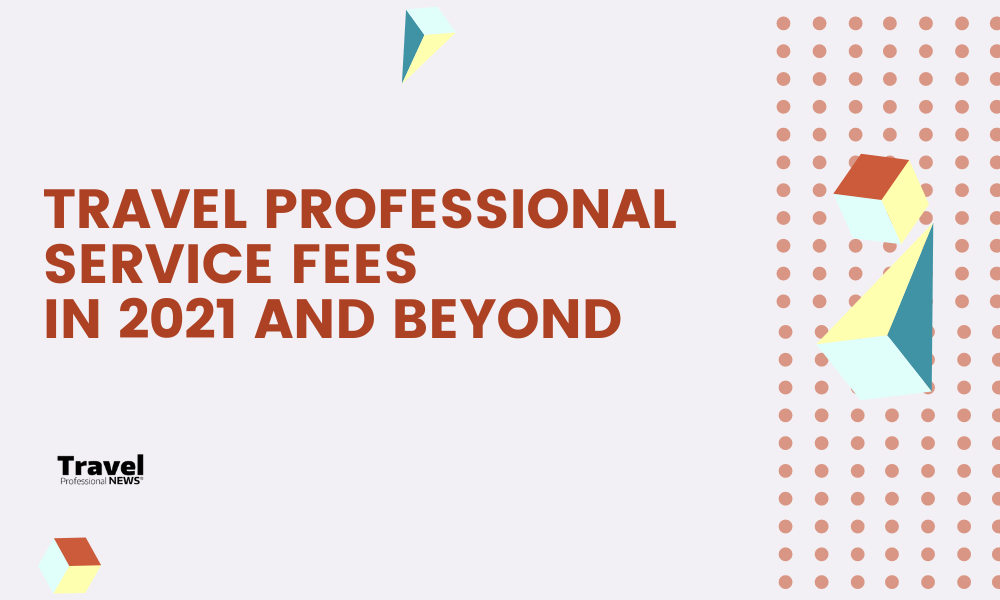
In a Post-COVID World, Travel Professionals Must Learn and Implement Service Fees for Success as a Home Based Travel Agent
The COVID-19 pandemic caught many travel professionals without having a structured service fee in place and many ended up working hour after hour with virtually no pay for doing so. The benefit for consumers was that they realized how important it was to have an advocate in their corner, as most travel distribution channels were unable, or unwilling to try to resolve the chaos that mass cancellations and the closing of the travel industry world wide created. As a result, it is obvious that travel professionals need to have a well thought out service fee agreement to avoid the loss of income if and when disaster strikes.

Service fees have been a hot topic for travel professionals ever since the airlines did away with airline ticket commissions. Before that time, very few agents charged service fees, as the commissions were robust and getting an agency into profitability was quite easy. During the period subsequent to the elimination of airline commissions, charging service fees has been all over the board. Some agencies do and some don’t. There is no set amount that agents typically charge either.
With the COVID pandemic, every travel agency ended up working harder and harder to keep their heads above water and those that had a service fee structure in place were much more prosperous than those that did not. The beauty of having a special niche is that consumers are more than happy to pay for top quality advice that will end up in their having a more satisfying and successful vacation experience. At this point in history, service fees are something that every travel agency should use as a part of their overall revenue stream.
Airline Commissions and Cruise NCFs
Over the years, suppliers have reduced commissions paid to travel agents, by either reducing the commission rate, or increasing the non-commissionable portion of a sale. Airline commissions were paid at 10% of the airline ticket price and was gradually reduced to 0% as technology reduced the role of travel agents and the need for them to both process payments and document the sale in the form of an airline ticket. Cruise lines also increased the portion of the cost of a cruise fare as a “Non-Commissionable Fare”. While initially NCFs were described as “port fees and other expenses” it became obvious to everyone that NCFs were simply a way for cruise lines to lower the commission amount paid to travel agencies.
Travel professionals that handle commodity transactions (domestic airline tickets, domestic hotel reservations, 3 and 4 day cruises and so on) use service fees to stabilize revenues from sales since the transaction generates an insufficient amount of money to sustain profitability. These kinds of service fees are generally what a travel agent thinks of when planning their revenue stream.
Known as a “transaction fee” agents generally charge a flat fee per transaction regardless of the dollar amount of the transaction. The amount of the fee is dependent upon your agency’s overhead, your business plan and the amount of commodity transaction the agency performs. Understand that a transaction fee is a charge for completing a transaction, not a service fee that implies ongoing service. As an example, an airline ticketing fee does not include refunds, changes or any other transaction type. Here are some examples of commodity type transaction fees.
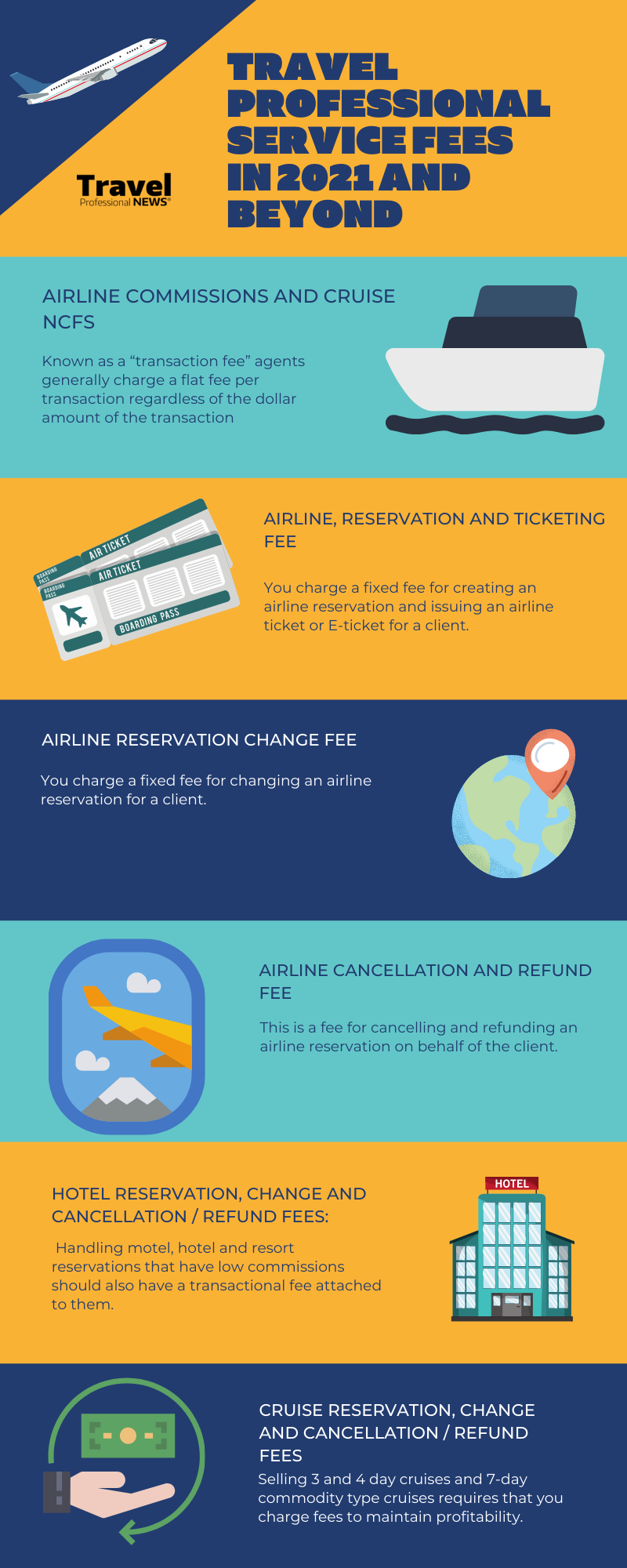
Airline, Reservation and Ticketing Fee
You charge a fixed fee for creating an airline reservation and issuing an airline ticket or E-ticket for a client.
Airline Reservation Change Fee
You charge a fixed fee for changing an airline reservation for a client.
Airline Cancellation and Refund Fee
This is a fee for cancelling and refunding an airline reservation on behalf of the client.
Hotel Reservation, Change and Cancellation / Refund Fees
Handling motel, hotel and resort reservations that have low commissions should also have a transactional fee attached to them.
Cruise Reservation, Change and Cancellation / Refund Fees
Selling 3 and 4 day cruises and 7-day commodity type cruises requires that you charge fees to maintain profitability. As many agents learned during the pandemic, they were faced with cancellations, rebooking and refunds without remuneration. Don’t get caught in this situation.
Each client will have different needs and expectations so you should be crystal clear about your transactional fees and what is included. This is best done in a written document that the client signs so that you have a copy in the client file.
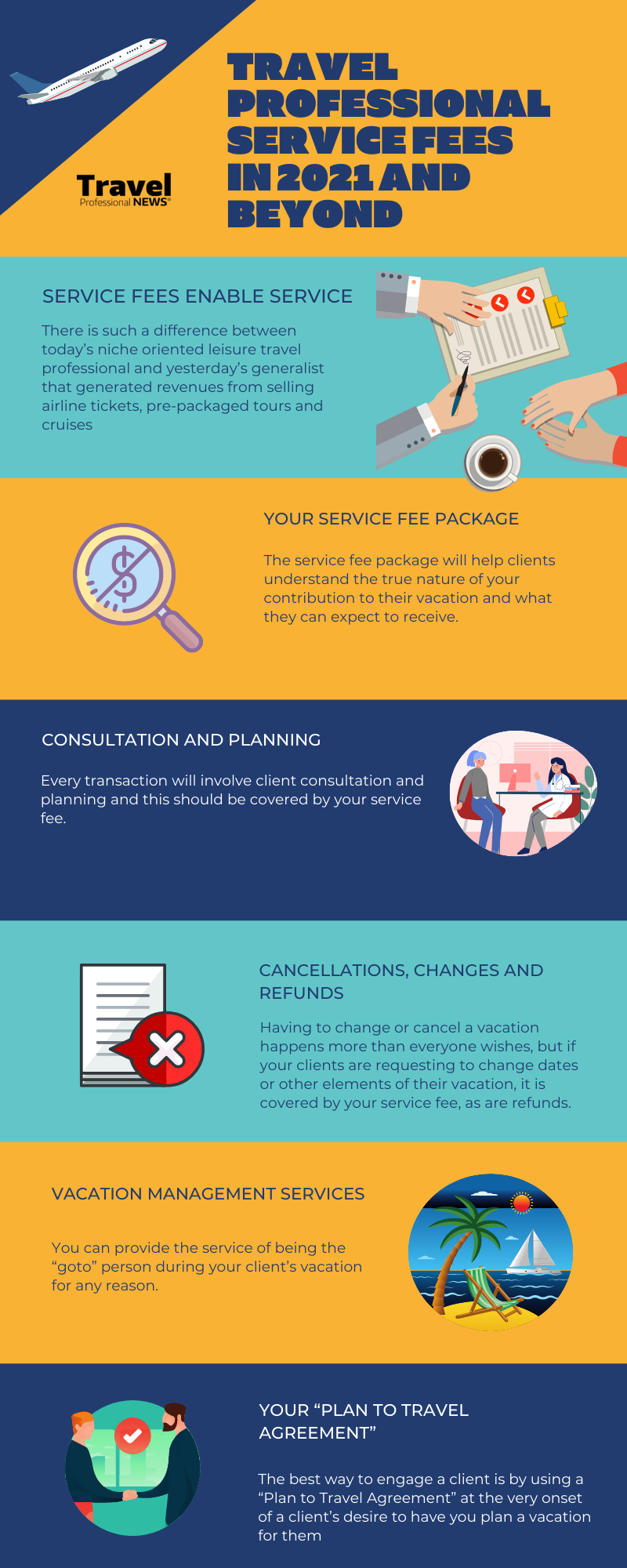
Travel Agency Service Fees Enable Service
There is such a difference between today’s niche oriented leisure travel professional and yesterday’s generalist that generated revenues from selling airline tickets, pre-packaged tours and cruises. There is also a huge difference between selling commodity type transactions and complex leisure transactions.
If you think of travel generalist as being like someone that works in a retail clothing store selling clothes. Sure, they may help you pick out a nice shirt and ring up the sale when you are done, but you would not expect much more than that as a customer. Since the sale of off-the-rack clothing is basically a commodity transaction, there is no promise or expectation of exceptional service.
But, if you visit a tailor who is also in the business of selling clothes, but he or she is a specialist and may focus strictly on creating men’s suits at a high price point. His or her service might include several fittings, alterations and adjustments before the suit is completed and they would also offer after sale service such as additional alterations and adjustments. In effect, the tailor is in the complex service business and customers have every right to expect exceptional service and results.
Your Travel Agency Service Fee Package
While you have your agency’s transactional fee schedule, you should also offer clients a service fee package that outlines the various benefits that they will receive by using your services. The service fee package will help clients understand the true nature of your contribution to their vacation and what they can expect to receive. There are various types of services that you can provide the traveler and they are all extremely important.
Consultation and Planning
Every transaction will involve client consultation and planning and this should be covered by your service fee. One of the biggest complaints from travel professionals that do not use service fees to cover this cost is that they do all of the work only to have the client book it online, or somewhere else. Having your Travel Agent Service Fees cover this is the way to go.
Cancellations, Changes and Refunds
Having to change or cancel a vacation happens more than everyone wishes, but if your clients are requesting to change dates or other elements of their vacation, it is covered by your Travel Agent Service Fees , as are refunds.
Vacation Management Services
You can provide the service of being the “goto” person during your client’s vacation for any reason.
- Changes: If your client needs to change their itinerary while on vacation for any reason, you can make it happen for them.
- Cancellations: You would manage cancellations at your client’s request.
- Travel Documents: You can have digital copies of all the clients travel documents so that if they lose them you can easily provide them with copies.
- Emergency Intermediary: Should your clients have a medical emergency while on vacation you would be the intermediary between the clients and the insurance company. You would be able to act on your client’s behalf for any emergency that occurs while they are traveling.
- Lost Luggage Tracking: Should the client’s luggage become lost, you can track it down on the client’s behalf and make sure the it is delivered to the correct location.
- Reconfirming Their Itinerary: You can reconfirm the key components of your client’s vacation before they arrive and also let suppliers know if they are going to arrive early or late.
You can structure your service fee package much like the tailor’s services in the above example. The tailor would offer x number of fittings, y alterations and z post completion alterations. You should spell out exactly what the client is getting in no uncertain terms. This could be x consultation hours, y changes and z post sale support.
Your “Plan to Travel Agreement”
The best way to engage a client is by using a “Plan to Travel Agreement” at the very onset of a client’s desire to have you plan a vacation for them. You explain that you will need to invest x number of hours in planning the travel event and that you normally charge an upfront service fee for planning it. You can also explain that you will provide them a firm quotation for their travel event that they can then shop on the Internet or anywhere they would like. Of course, if the travel event has excellent internal yields, you would probably deduct the service fee from the quote that you provide the client making it difficult for anyone else to compete on a price basis.
You should use a Plan to Travel Agreement for consulting fees, vacation, FIT and group planning and all the various pre and post travel activity as mentioned above. By conveying the various benefits that they will receive and the comfort knowing that they have a knowledgeable contact should anything come up during their vacation, signing the Plan to Travel Agreement will be very easy for them to do.
Here is a sample Plan to Travel Agreement that you can modify to meet your own needs. You Can also Download it Here .
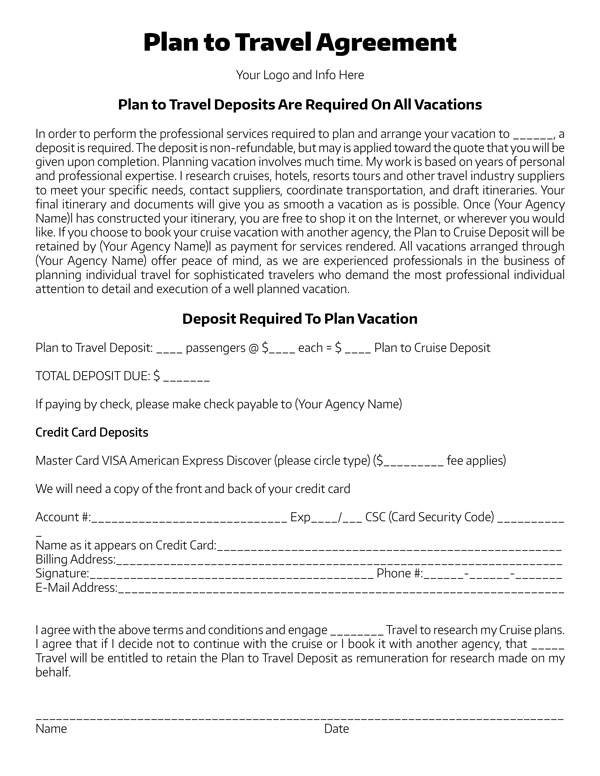
- All Inclusive Resort
- Association and Events
- Host Agency
- Hotel and Resort
- River Cruising
- Tour Operator
- Sales and Marketing
- Your Travel Business
- Suppliers and Destinations
- Trade Associations and Events
- Free Downloads
- Your Travel Agency
- Destination
- Host Agency List
Add Travel Professional NEWS® to your Homescreen!
To Charge or Not to Charge: A Breakdown of Fees for Travel Agents
In the past, a travel agent charging a fee for their services was unheard of. But the value of travel agents has become more apparent than ever, especially since the impact of COVID-19 on the industry has been a significant one. It’s now becoming more mainstream for these professionals to charge fees for their services.
The Problem with Not Charging Service Fees
For almost every agent in the travel industry, whether they hold a Florida travel agency license , a New York travel agent license, or credentials anywhere else, the bulk of their income still comes from commissions. It isn’t always easy to earn a sustainable income on commissions alone.
Commissions don’t account for the countless hours agents spend ironing out all kinds of details for their travelers. Hence, many people now believe that travel agents should be charging service fees, especially when they save their clients so many hours of their own planning, research, booking, and revising.
It Can Be Difficult “Asking” for Money
While it’s easy to say that travel agents need to be their own advocates, it isn’t always easy to ask for money. Many people aren’t comfortable with it and don’t have it as a part of their daily MO.
Some agents use the “no fees” promise as part of their marketing platform, and this is okay. If you do want to begin charging fees, consider starting out by charging for certain services and not others.
Have a Florida Travel Agency License? Or a License in Any Other State? Charge for These Services
No matter where you operate your business, you’ve worked hard to get your travel agent license and establish yourself as a travel advisor. Consider charging for the following services, if nothing else:
Booking Non- or Low-Commissionable Reservations
These include smaller vendors, independent hotels, and even leisure air travel bookings.
Booking Air-Only Travel
Charging a fee for air ticketing is not uncommon for corporate travel agents, so leisure agents can follow suit as well.
Booking FITs or Anything that Is Customized
By default, it takes agents more time to create and book FIT itineraries, and it makes sense to be compensated for the extra time and effort.
Booking Add-Ons
Travel advisors who offer personalized “concierge” services, including in-depth planning of itineraries, should be compensated for the research, ticketing, and ongoing maintenance that is created with add-ons.
A Final Tip for Travel Agents
As a travel agent , you don’t click a magic button or wave a wand to pull travel itineraries, reservations, and plans together; you work really, really hard at it. If you’re not comfortable charging blanket fees for your services, consider starting out by charging only for some services.
- Skip to content

Travefy Academy
Win and retain more business.
A Quick Guide to Charging Fees as a Travel Agent
By Travefy Academy

Should you charge a planning fee to your clients? This is a popular question among many travel agents whether you’re new to the travel industry or a veteran.
In a previous Travefy Academy webinar, we chatted with Sandy Saburn, VP of Sales at Gifted Travel Network and she shared why travel agents should always charge planning fees. To watch this webinar, click here or watch below. In the webinar, she walks through the different types of fees and how to charge your clients.
If you would rather read about fees, scroll past the video for more information!
Why charge a fee?
First, the most important question: Why even charge a fee?
The simple answer is because you are the expert, your clients are using your expertise to help plan their travel. Take for example when you go to the dentist. You may have to pay for additional add-ons like fillings or extra dental work, but you still have to pay the fee to just see the dentist first.
As a travel agent, you aren’t just booking travel (that’s only part of the job), you are also researching, offering expertise, and planning so you should get paid for that too because that can end up being hours upon hours of your time. If you aren’t charging a fee, you will only earn commissions on what you book, which is still amazing but when you have a fee coming in too that’s just another source of revenue for your business.
Think about it this way: Let’s say you book a trip and earn a $1,000 commission. If you were to include a service fee of $250, that’s an extra 25% to the bottom line! It also helps you feel empowered to go above and beyond for your clients because you’re getting compensated to do so.
Another reason why many travel agents charge fees is because it can help weed out the “window shoppers” to your actual paying clients.
How to decide your fee price.
Most likely the hardest part is trying to put a price tag on your expertise. If you’re new to the industry, you might undervalue yourself and that’s okay if you want to work on raising your fees in the future but don’t underestimate how much work you will be putting in for clients.
According to the Gifted Travel Network , most successful travel agents are charging over $125 for a fee. You can always start around that price range where you feel most comfortable and increase in the future. You can also set limits around this fee. For example, if you are asked to plan a trip for a large group which include many tours, activities, accommodations, flights, etc. maybe you increase the fee to each couple or every x amount of people.
How to approach the fee conversation.
We get it, asking for money from a potential new client can be challenging because you obviously don’t want to scare them off! So to be successful at charging a fee you first want to be confident enough in yourself that you deserve a service fee. Just think about all of the research and planning that you will be spending on this client and let them know up front that you will be requiring a fee and list out why you are charging the fee (time of planning, research, and making it the best trip possible for the traveler).
Decide ahead of time when you introduce the fee into the conversation as well. Whether you want to wait until they request a proposal or quote or up front at the very beginning. If you decide to post in advance on your website, you may lower your leads but that will better qualify your clients. Find what works best for you and your business and run with it!
Cherry Picked!
Hand-selected articles, guides, and more from the makers of Check Cherry, designed to help your business grow and flourish.
Charging Your Clients Travel Fees [Beginners Guide]

If you travel to provide services to your clients, there is a good chance you've considered implementing travel fees. In this article, we'll cover everything you need to know about travel fees and provide some actionable advice to ensure you're doing it right.
What is a travel fee?
A travel fee is an additional fee added to your standard pricing. Often, travel fees vary based on the distance one travels. The further one travels, the higher the travel fee.
👉 Use a quality online booking system with travel fees built-in, like Check Cherry, so you can automatically calculate and charge clients travel fees. It saves a lot of time and ensures accurate billing.
Why do people charge travel fees?
If you package your services, there is a good chance you've factored some travel into your pricing. However, if a client needs you to drive 62 miles, your standard pricing may no longer be profitable. Travel fees allow you to service a larger geographic area by offering clients the option to compensate you for travel.
Should I charge travel fees?
If you're open to traveling further distances to work and leveraging packages to sell your services, you should charge travel fees because they will ensure you are operating profitably.
If you are unwilling to travel outside a smaller area or send proposals with custom pricing to each client, you might want to lump all costs into one price to ensure each booking is profitable.
👉 Travel fees give more people the opportunity to hire you because it expands the geographic area you are willing to serve.
Distance-Based Travel Fees
We often see our customers include a free travel range with all packages. For example, the first 30 miles are free, and if they must drive more than 30 miles, it's $2.00 per mile. Distance-based travel fees are outstanding because they are granular and account for time and fuel costs best.
Flat Rate Travel Fees Tiers
Some people like to charge a flat fee for travel. For example, one's travel fee structure might look like this:
0-25 miles - FREE
25-50 miles - $35 Flat Fee
50-100 miles - $125 Flat Fee
This option is much less popular. One positive aspect is you can make one tier meaningfully more expensive than another.
Round-trip or one-way?
The majority of Check Cherry customers charge one-way travel fees. If a wedding venue is 55 miles away, they charge a travel fee based on 55 miles (single trip). Another option is calculating based on the length of getting to and from the service address (round trip).
One-way calculations make it easier for the client to understand your fee structure because most clients will not think to double the distance. If you opt to charge on a one-way basis, consider increasing your per-mile fee to account for the trip back home.
On the other hand, the round trip calculation will make the per-mile fee appear lower than a single trip fee. This may be helpful during the initial sales process. Round-trip is also a more accurate representation of actual costs associated with you traveling on behalf of a client.
Should I just use the rates provided by the IRS?
Each year, the IRS releases Standard Mileage Rates . In 2022, the amount was 58.5 cents per mile. Check with the IRS or your tax professional each year and track mileage for any business purposes. Regardless if you charge travel fees or not, you can deduct the cost per mile that you travel for business. Talk to your accountant about how to do it right.
Remember that the number provided by the IRS each year is based on an annual study of the fixed and variable costs of operating an automobile. It's probably a mistake to charge clients based on rates set by the IRS.
How much should I charge my clients for mileage?
This answer will vary by market, service type, and ideal customer profile. Here are three factors to consider when calculating a travel fee:
Travel time
One of the more significant expenses is your time, and travel will effectively increase the time you need to dedicate to complete your service. If you have staff, you probably want to pay them for travel time to ensure they want to work a booking or event.
Gas prices are outrageous. Do a rough calculation to see what it goes to drive 15, 25, or 50 miles based on your fully-loaded vehicle.
Vehicle wear and tear
The more you drive a vehicle, the more it costs to own due to depreciation, interest on your loan, insurance premiums, maintenance, and repairs. Estimates can be as low as $0.21 per mile and more than $0.62 per mile. You can use this handy calculator to get an estimate for your vehicle.
Example Travel Fee Calculation
Here is an example of how one might estimate the true costs of travel.
Fuel - $0.206 per mile
Cost per gallon of fuel: $4.33
Miles per gallon of fuel: 21
Fuel cost per mile = $0.206 cents per mile ($4.33 / 21)
Wear & Tear - $0.66 per mile
5 Year Vehicle Wear and Tear = $49,515
Vehicle Wear and Tear Per Year = $ 9903 ($49,515/ 5)
Per Mile Wear and Tear = $0.66 ($9903 / 15,000 miles)

Staff Costs - $0.517 per mile
Distance to Venue: 38.7 Miles
Travel Time: 1 Hour
Hourly Rate: $20
Cost per mile = $0.517 ($20 / 38.7 miles)

Estimated Travel Fee
$1.38 per mile ($0.206 + $0.66 + $0.517)
Automatic Travel Fee Calculations
Watch how Check Cherry makes it easy to calculate and charge travel fees . You can create multiple travel zones, limit bookings outside your service area, and more.
People will ❤️ how easy it is to book you online.
Try Check Cherry free for 14 days, no credit card required.
⭐⭐⭐⭐⭐ "I love it!"
"I found Check Cherry when doing a search for something to schedule mini sessions for my photography business. It's the perfect end to end online booking and payment solution. I has made my work so much easier, and its convenient for my clients to click to select their session, sign the contract, and pay. I love it! Not to mention, their customer service is on point. Quick response time and open to suggestions. Fantastic!"
Understanding travel agency fees: the essential guide

Whether you're planning a business or leisure trip, you might want to save time by using a travel agency. The concept of a tour operator is simple: buy holidays in bulk and for less. This solution often saves you a lot of money, but it's essential to take travel agency fees into account. Here's what they include!

What are the travel agency fees?
Travel agency fees cover part of the administrative costs involved in booking and managing your trip. These may include flight searches, accommodation reservations, train or plane tickets, transfer coordination, etc.
Not all travel agencies charge handling fees, but the vast majority do. When you're planning a trip with a travel agency, we advise you to find out about any fees beforehand. This should be done right from the start of the process, so that you clearly understand the costs associated with their services, and avoid unpleasant surprises at the final settlement!
To give you an idea, here's an overview of what a travel agency's handling fee includes.
Consulting fees
First of all, travel agencies may charge a consulting fee for the time spent talking with you, understanding your needs, your preferences in terms of destinations, airlines and type of accommodation, and developing a customized itinerary. Consulting fees also include planning fees, covering the time and effort invested by the agency in designing a trip tailored to your specific needs.
Service, management and transaction fees
Service fees refer to reservations for airfare, accommodations, car rentals, as well as certain travel-related activities. Travel agents coordinate the various elements of the trip to ensure that everything is synchronized, such as flight schedules and hotel reservations. Typically, transaction fees are charged as a percentage of each reservation, modification or cancellation on your behalf.
Service and management fees can also include administrative costs, linked to the agency's general administrative costs, such as the maintenance of reservation systems, personnel, office expenses, etc.
Assistance costs
The advantage of using a travel agency is that they often offer 24/7 assistance throughout the planning stage, as well as ongoing assistance during the trip in case of problems or unforeseen situations.
Insurance costs
Going through a travel agency sometimes involves extra charges for travel insurance, either included or optional. This offers protection to travelers in the event of unforeseen circumstances. Travel insurance costs cover various aspects:
- trip cancellation due to unforeseen circumstances such as illness, accident or death of a family member;
- trip interruption for medical emergencies or unexpected events ;
- medical insurance to cover emergency medical expenses abroad, including hospitalization;
- baggage insurance guaranteeing reimbursement in the event of loss, theft or damage to baggage during the trip;
- third-party liability covering damage caused to third parties during the trip.
Insurance costs in France may vary according to the coverage chosen by the agency and the duration of the trip. Find out which travel insurances are best for you , and contact your bank. You may already have adequate travel insurance with your bank card!
Booking through a travel agency: is it more expensive?
If you're thinking of entrusting your travel project to an agency, you're probably wondering: will I pay more? Because if the travel agency is working on my trip, there are bound to be costs!
The answer is no, it won't cost you more. On the contrary, it often saves you money! Whether it's for low-cost or first-class air tickets, accommodation, activities or tours, the travel agency negotiates contracts with various brands and companies at the best price, and obtains exclusive promotions.
So, if you use a travel agency, the chances are that the price of your holiday will be lower than if you booked directly with each service provider. In many cases, travel agencies can help you save money. The only thing to bear in mind is the booking fee, which varies from one agency to another, depending on the services offered.
What percentage does a travel agency take?
Most travel agencies take between 9% and 15% commission for anything to do with services, stays or tours. For a single airline ticket sold, a travel agency might take 8% of the public price.
However, this percentage varies from one travel agency to another, depending on the services they offer. Some travel agencies may charge between 15% and 20% commission. Make sure you find out what the fees are before embarking on your adventure with a travel agency, and above all, use an agency that is transparent about them!
Why use a travel agency?
The first advantage of using a travel agency is that it saves you time . Travel agents can take care of your trip from A to Z. If you've ever planned a trip, you know how complex and time-consuming it can be. Travel agents take care of planning, hotel reservations, flights, transfers and other details that save you time and energy.
Travel agents are experts in their field and can provide you with useful advice on destinations, the best times to go there, activities to do, and so on. Their in-depth knowledge can help you plan a trip perfectly suited to your needs and preferences.
Then, the second big advantage is that they give you access to preferential rates and exclusive offers, having negotiated with their partners. This means you'll get better deals than if you booked with each provider yourself.
Finally, when you use a travel agency, you often benefit from assistance in the event of a problem (flight delays, cancellations or accommodation problems, etc.). This takes the stress out of your trip, and allows you to quickly resolve any unforeseen situations with a single point of contact!
What's the difference between a travel agent and a travel agency?
A travel agent is someone who works for a travel agency, or who works independently. They help you plan your trip, book flights and hotels, and advise you on visas, travel insurance and tourist activities.
A travel agency is a commercial enterprise that composes and sells a range of travel-related services. It is made up of one or more travel agents.
There is no better option between the two, it all depends on the quality of the services provided by the agency and the independent travel agent, and of course, the prices of the trips offered and the handling fees!
Travel agencies are required to provide a financial guarantee to ensure that travelers are reimbursed in certain situations, such as trip cancellation, non-performance of scheduled services or even bankruptcy of the agency itself. The aim is that, should something go wrong, you're protected from A to Z.
Today, the majority of companies work with a travel agency to plan their business trips, and find it a real added value in terms of travel management.
To help office managers, we've developed Fairfees , which compares your travel costs across different agencies. This easy-to-use simulator will help you choose the travel agency best suited to your needs.

2024 tax scale: new features and changes
Introducing new measures, the 2024 tax schedule has an impact on professionals. Understanding these changes is crucial to optimizing tax man

Deducting your Actual Costs in 2024: Complete Guide
For actual costs in 2024, this guide provides all the information you need to optimize your declarations, whether you are a profession

Vueling invoice: how to retrieve it easily?
Need to recover a Vueling invoice after a flight? We'll explain the process and give you some advice.

Business Travel Tax: a Practical Guide
Optimize your tax return for business travel with our guide to deductible expenses and mistakes to avoid.

See Fairjungle in action.
Take back control of your business travel! Discover the new-generation corporate travel agency.

3 Steps to Charge Planning Fees: A Guide for Travel Agents

If you’re wondering how to charge a professional planning fee as a travel agent, stick around!
First things first, if you’re on the fence about charging a fee for your travel services, I encourage you to check out an article I did a while back on why you should consider charging a professional travel planning fee .
Steps to Charge Planning Fees
Okay, let’s jump into the fabulous discussion of travel planning fees and how the heck to start implementing them.
🌟 Step #1: Change Your Process for When You Get a Lead
I share my exact process for this in my 20K System & Toolkit Destination Wedding Business Course, but essentially, you need a new way to close the deal.
You may be already doing part of this, but the best way to turn a travel lead into a travel client is to do a consultation .
Stop allowing open-ended discussions and quotes flying left and right without first getting the prospective client to realize you’re a professional.
So, the next time the phone rings or a DM hits you up on social, send them a link to schedule a consultation .
As a reminder, the consultation is not a chance for them to pick your brain and suck the life out of you; it is an opportunity for you to be in control of the conversation and ask the questions you would need to know to provide expert travel planning services.
🌟 Step # 2: Showcase Your Value
Once you finish the consultation, you’ll want to send your list of services along with your planning fee.
The best way to do this is to list everything you will be helping your clients with, and then at the bottom of that, you’ll share your professional planning fee.
In my destination wedding business course, the 20K System & Toolkit (because you can make 20K from planning one destination wedding), I have two examples of this in our toolkit—one for just starting and one for the more advanced destination wedding expert.
I’m sharing this because it is okay to start where you are. It is OK to have a small professional planning fee. As you get more experienced and confident, you can raise your prices.
I know you will ask me, “How much should I charge for my travel planning services?” So, I’m not going to leave you hanging.
I’ll share my minimum recommended travel planning fees based on whether you are a newer agent or at least new to charging professional planning fees, as well as for the season travel expert.
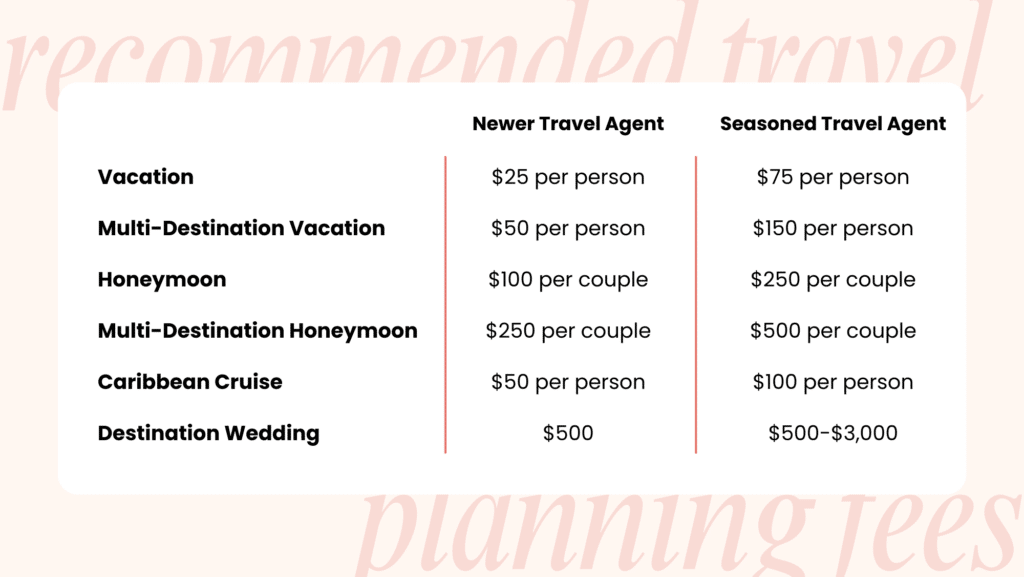
Again, these are just examples and my professional opinion. I have been a travel agent since 2008 and have changed my fee structure multiple times. I was a “My services are free!” travel pro, so I know how intimidating it is to implement this. Start where you feel confident.
🌟 Step # 3: Have a Way to Invoice and Collect a Fee
Can I just say that without this third step, charging a professional planning fee for your wedding or travel planning services won’t fly?
Once your client agrees to hire you, you will want a professional contract they will sign and a way to invoice them.
I have an example of the terms you’ll want in your contract in my course, but the main thing that you need to ensure is that you aren’t responsible for things outside your control. I know some agents are also putting “bullying” clauses in their contracts.
Hiring a legal professional to write this up for you is best. It is an investment that will pay dividends over the years and protect you from people who would otherwise take advantage of you.
These three steps are the foundation for charging fees and having a great relationship with clients who will work with you for all their travel needs.
Something that I learned the hard way in my travel business was that unless I treated myself as a professional first, no one would.
You got this, and I believe in you!
If you’re looking for step-by-step training for destination wedding travel agents, I invite you to the 20K System & Toolkit !

Post navigation
Previous post.

No comments yet. Why don’t you start the discussion?
Leave a Reply Cancel reply
Your email address will not be published. Required fields are marked *
https://my.timetrade.com/book/D9RDN

“Amy reminded me to be true to myself, and gave me all of the tools I needed to make the shift, and start showing up as me.”
I was a psychotherapist for years, but it wasn’t until I stumbled upon the whole online world, and saw the opportunity to have a business outside of my 1-on-1 work, that I was like, “This is amazing!” I invested in a lot of products early on, but I never got around to using them for anything.
In the meantime, I started my consulting and life coaching businesses, but it was a struggle because I still had to shift gears from 1-on-1 client work to an online business mindset.
I first found out about Amy at an event in California and I just started consuming all of her podcasts and emails… and I loved them. I signed up for List Builders Lab™️, then Digital Course Academy™️, and I jumped right in.
- More Networks
The Enlightened Mindset
Exploring the World of Knowledge and Understanding
Welcome to the world's first fully AI generated website!
What Do Travel Agents Charge? An Overview of Fees and Services
By Happy Sharer

Introduction
Travel agents are professionals who specialize in helping people plan and book trips. They can help with everything from researching destinations and planning itineraries to booking flights, hotels, and activities. But what do travel agents charge for their services? In this article, we’ll explore the different fees and services that travel agents provide.
The Pros & Cons of Working with a Travel Agent
When it comes to planning a trip, there are pros and cons to working with a travel agent. On one hand, they can save you time and energy by doing the legwork of researching and booking all your travel arrangements. On the other hand, they may charge fees for their services, which could end up being more expensive than if you had done the work yourself.
Benefits of Working with a Travel Agent
One of the biggest benefits of using a travel agent is that they are experts in the field and can save you time and energy when it comes to planning your trip. A good travel agent will be able to give you personalized advice on where to go and what to do. They can also help you find the best deals on flights, hotels, and activities.
Travel agents also have access to a variety of tools and resources that can make the process of planning a trip easier. They can use these tools to quickly compare prices and find the best options for you. Additionally, they may have relationships with vendors that can help you get better deals or exclusive offers.
Disadvantages of Working with a Travel Agent
One of the main drawbacks of using a travel agent is that they may charge fees for their services. Depending on the type of service, these fees can range from a flat rate to a percentage of the total cost of the trip. Additionally, some travel agents may charge additional fees for certain services, such as booking flights or making changes to an existing reservation.
Another disadvantage of working with a travel agent is that they may not always be able to get you the best deal. For example, they may not be aware of special promotions or discounts that are available online. Additionally, some travel agents may not be as knowledgeable about certain destinations or activities, so it’s important to do your own research as well.
What Types of Services Do Travel Agents Provide?
Travel agents can provide a variety of services, depending on your needs. Here are some of the most common services offered by travel agents:
Flight Bookings
Travel agents can help you find the best deals on flights, whether you’re looking for domestic or international flights. They can compare prices across different airlines and look for special deals or discounts. They may also be able to get you upgrades or other amenities.
Hotel Reservations
Travel agents can help you find the perfect hotel for your trip. They can compare prices across different hotels and look for special deals or discounts. They may also be able to get you upgraded rooms or other perks.
Car Rentals
Travel agents can help you find the best deals on car rentals. They can compare prices across different companies and look for special deals or discounts. They may also be able to get you upgrades or other amenities.
Cruise Bookings
Travel agents can help you find the perfect cruise for your next vacation. They can compare prices across different cruises and look for special deals or discounts. They may also be able to get you upgrades or other perks.
Tour Packages
Travel agents can help you find the perfect tour package for your next trip. They can compare prices across different tours and look for special deals or discounts. They may also be able to get you upgrades or other perks.
How to Find the Best Deals with a Travel Agent
When it comes to finding the best deals with a travel agent, it’s important to do your research. Here are some tips for finding the best deals with a travel agent:
Research Various Travel Agents
It’s important to research different travel agents before choosing one. Make sure to read reviews from other customers and ask for recommendations from friends and family. You should also check to see if the travel agent is a member of any professional organizations, such as the American Society of Travel Agents (ASTA).
Compare Prices and Services Offered
Once you’ve narrowed down your choices, compare prices and services offered by each travel agent. Look at the total cost of the trip, including any fees they may charge, and make sure to read the fine print. It’s also important to compare the types of services offered, such as flight bookings, hotel reservations, car rentals, etc.
Look for Special Deals and Discounts
Make sure to ask the travel agent if they offer any special deals or discounts. Some travel agents may have exclusive offers or access to special promotions. Additionally, many travel agents offer loyalty programs or rewards for repeat customers.
How Much Does it Cost to Use a Travel Agent?
The cost of using a travel agent can vary depending on the type of services they provide. Here is a breakdown of the typical fees charged by travel agents:
Typical Fees Charged by Travel Agents
Most travel agents will charge a fee for their services, which can range from a flat rate to a percentage of the total cost of the trip. For example, some agents may charge a flat fee of $50 for their services, while others may charge a 10% commission on all bookings. Additionally, some agents may offer discounted rates for repeat customers or large groups.
Additional Fees That May Be Charged
In addition to the standard fees, some travel agents may charge additional fees for certain services. For example, they may charge a fee for making changes to an existing reservation or for booking flights or cruises. Additionally, some agents may charge a service fee for processing payments or for providing additional assistance.
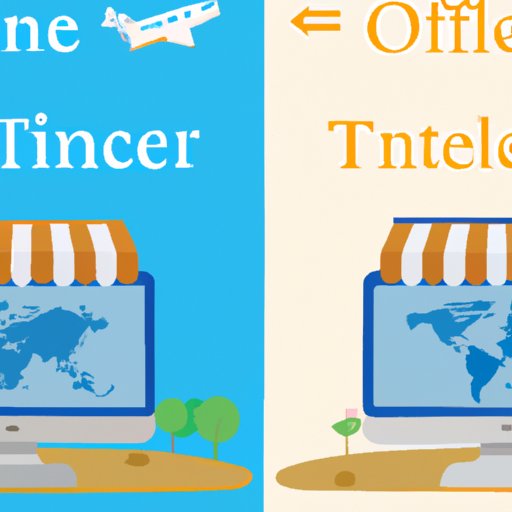
The Difference Between Online and Offline Travel Agents
There are two types of travel agents: online and offline. Each type has its own advantages and disadvantages, so it’s important to consider both when deciding which one to use.
Advantages of Online Travel Agents
Online travel agents are convenient and often offer lower prices than offline agents. Additionally, they may have access to special deals or promotions that are not available through traditional travel agents. Another advantage of online travel agents is that they can typically provide 24/7 customer support.
Advantages of Offline Travel Agents
Offline travel agents can provide personalized service and advice. They can help you plan a customized trip that meets your specific needs and budget. Additionally, they may have relationships with vendors that can help you get better deals or exclusive offers.
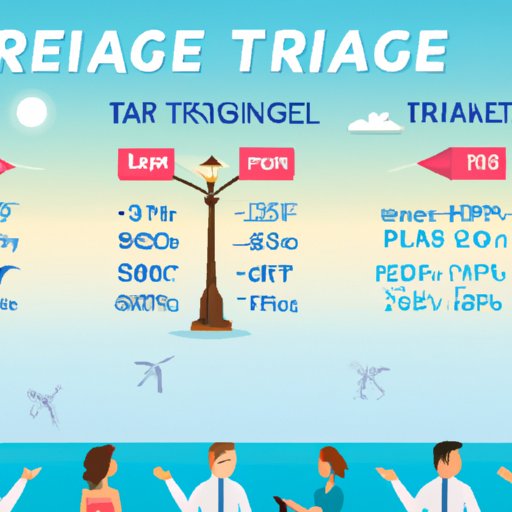
How to Compare Prices and Fees Between Different Travel Agents
When comparing prices and fees between different travel agents, there are a few things to keep in mind. Here are some tips for comparing prices and fees between different travel agents:
Consider the Total Cost of Your Trip
It’s important to consider the total cost of your trip when comparing prices and fees between different travel agents. This includes the cost of flights, hotels, car rentals, tours, and any additional services you may need. Make sure to add up all the costs to get an accurate picture of the total cost of the trip.
Check for Any Hidden Fees
It’s also important to check for any hidden fees that may be charged by the travel agent. These can include fees for making changes to an existing reservation or for booking flights or cruises. Make sure to ask the agent about any additional fees before booking.
Read Reviews from Other Customers
Finally, make sure to read reviews from other customers before booking with a travel agent. This can help you get an idea of the quality of service they provide and the types of deals they may be able to get you. Additionally, reading reviews can help you avoid any potential scams or shady practices.
Travel agents can be a great resource for planning your next trip. They can save you time and energy by doing the legwork of researching and booking all your travel arrangements. However, it’s important to understand what fees and services travel agents provide and how to find the best deals. By doing your research and comparing prices and services between different agents, you can ensure that you get the best deal possible.

Summary of the Article
This article explored what travel agents charge for their services. We discussed the pros and cons of working with a travel agent, the types of services they provide, how to find the best deals, and the difference between online and offline travel agents. Finally, we provided tips for comparing prices and fees between different travel agents.
Final Thoughts on Choosing a Travel Agent
Choosing the right travel agent can make a big difference in the cost and quality of your trip. Make sure to do your research and compare prices and services between different agents. Additionally, be sure to read reviews from other customers and check for any hidden fees. With the right travel agent, you can ensure that you get the best deal possible for your next vacation.
(Note: Is this article not meeting your expectations? Do you have knowledge or insights to share? Unlock new opportunities and expand your reach by joining our authors team. Click Registration to join us and share your expertise with our readers.)
Hi, I'm Happy Sharer and I love sharing interesting and useful knowledge with others. I have a passion for learning and enjoy explaining complex concepts in a simple way.
Related Post
Exploring japan: a comprehensive guide for your memorable journey, your ultimate guide to packing for a perfect trip to hawaii, the ultimate packing checklist: essentials for a week-long work trip, leave a reply cancel reply.
Your email address will not be published. Required fields are marked *
Expert Guide: Removing Gel Nail Polish at Home Safely
Trading crypto in bull and bear markets: a comprehensive examination of the differences, making croatia travel arrangements, make their day extra special: celebrate with a customized cake.
Winter is here! Check out the winter wonderlands at these 5 amazing winter destinations in Montana
- Travel Tips
What Are The Fees For A Travel Agency
Published: November 29, 2023
Modified: December 28, 2023
by Alexandra Dodge
- Plan Your Trip
Introduction
Planning a trip can be an exciting and thrilling experience, but it can also be overwhelming, especially when it comes to navigating the fees charged by travel agencies. While travel agencies play a valuable role in helping travelers find the best deals and creating memorable itineraries, it’s important to be aware of the various fees that may come into play.
Travel agency fees are designed to cover the costs associated with the services they provide. These fees can vary widely depending on the type of agency and the services rendered. In this article, we will explore the different types of fees that travelers may encounter when working with a travel agency.
Understanding these fees is crucial for travelers to budget accordingly and ensure they receive the best value for their money. Knowledge is power, and being aware of the fees ahead of time can help travelers make informed decisions and have a stress-free travel planning experience.
In the following sections, we will discuss the various types of travel agency fees, including consultation fees, service fees, booking fees, cancellation or change fees, itinerary planning fees, airline ticketing fees, visa processing fees, travel insurance fees, and baggage fees. By gaining a deeper understanding of these fees, travelers can avoid surprises and plan their trips more effectively.
It’s important to note that while some agencies charge specific fees for their services, others may include these fees within the overall cost of the trip. It’s always a good idea to clarify the fees and services with the travel agency upfront to ensure transparency and avoid any misunderstandings.
Now, let’s delve into the different types of travel agency fees and explore how they may impact your travel planning experience.
Types of Travel Agency Fees
When working with a travel agency, it’s essential to understand the different types of fees that may be involved. These fees are intended to cover the costs associated with the services provided. Here are some common types of travel agency fees:
- Consultation Fee: Some travel agencies charge a consultation fee for the initial meeting or discussion to understand the traveler’s preferences and requirements. This fee compensates for the time and expertise provided by the travel agent in researching and recommending suitable travel options.
- Service Fee: Service fees are charges imposed by the travel agency for their assistance in arranging transportation, accommodations, and other travel arrangements. This fee covers the time and effort spent by the agent in creating a customized travel itinerary and providing ongoing support throughout the trip.
- Booking Fee: Travel agencies may charge a booking fee for making reservations on behalf of the traveler. This fee covers the administrative tasks involved in securing transportation, accommodations, and other activities.
- Cancellation or Change Fee: If the traveler needs to cancel or make changes to their travel plans, a cancellation or change fee may apply. This fee compensates the travel agency for the additional work required to modify or cancel existing bookings.
- Itinerary Planning Fee: Some travel agencies offer specialized itinerary planning services, where they create a detailed day-by-day plan that includes activities, attractions, and dining options. This fee covers the time and expertise in curating a personalized itinerary.
- Airline Ticketing Fee: When booking flights through a travel agency, an airline ticketing fee may be charged. This fee covers the agency’s costs associated with issuing airline tickets and processing the necessary documentation.
- Visa Processing Fee: Travel agencies that assist travelers with visa applications often charge a visa processing fee. This fee compensates the agency for the effort and time spent in preparing and submitting visa applications on behalf of the traveler.
- Travel Insurance Fee: If the traveler opts for travel insurance through the travel agency, a travel insurance fee may be included. This fee covers the cost of the insurance policy and the administrative tasks involved in arranging coverage.
- Baggage Fees: In addition to the fees mentioned above, travel agencies may also inform travelers about potential baggage fees imposed by airlines. This ensures that travelers are aware of any additional costs they may encounter during their trip.
It’s important to note that not all travel agencies charge all of these fees. The specific fees and their amounts can vary depending on the agency’s policies and the services provided. When working with a travel agency, it’s wise to discuss all potential fees upfront to avoid any surprises later on.
Now that we have explored the various types of travel agency fees, let’s take a closer look at each one in more detail.
Consultation Fee
A consultation fee is a common type of fee that some travel agencies charge for their expertise and time spent in assisting travelers with their trip planning process. This fee is typically imposed during the initial consultation or discussion with the travel agent.
When travelers consult with a travel agency, they often seek guidance and recommendations for their upcoming trip. The travel agent will take the time to understand the traveler’s preferences, interests, and budget constraints. They will then use their expertise and knowledge to research and suggest suitable travel options.
The consultation fee compensates the travel agent for their time, research, and expertise in creating a personalized travel plan for the traveler. It acknowledges the value that the travel agent brings to the table in terms of their industry knowledge, access to special deals, and the ability to curate unique and memorable experiences.
While not all travel agencies charge a consultation fee, those that do typically offer additional services and benefits beyond just booking flights and accommodations. These agencies may have specialized knowledge in specific destinations, niche travel experiences, or luxury travel arrangements.
It’s important to note that a consultation fee is usually non-refundable, even if the traveler decides not to book with the agency. This fee reflects the time and effort invested by the travel agent in researching and planning the recommended travel options.
Consultation fees can vary in amount, depending on the agency and the level of service provided. Some agencies may charge a flat fee for the consultation, while others may have a tiered structure based on the complexity and duration of the trip.
Paying a consultation fee can be beneficial for travelers as they gain access to personalized recommendations, insider tips, and expert advice from a professional travel agent. With their industry knowledge and experience, the travel agent can help travelers navigate through the overwhelming amount of information available and create a well-planned and customized itinerary.
Before engaging with a travel agency, it’s important for travelers to inquire about any consultation fee and understand the services included in the fee. This allows travelers to make an informed decision and select the agency that best aligns with their travel needs and budget.
Now that we have explored the consultation fee, let’s move on to the next type of travel agency fee: the service fee.
Service Fee
A service fee is a type of fee charged by travel agencies for the services they provide throughout the trip planning process. This fee covers the time, expertise, and resources utilized by the travel agent to create a customized travel experience for the traveler.
When a traveler engages with a travel agency, they rely on the expertise of the travel agent to navigate through the complexities of the travel industry. The travel agent will provide valuable assistance in arranging transportation, accommodations, and other travel-related services.
The service fee compensates the travel agency for the following services:
- Researching and identifying the best travel options based on the traveler’s preferences and budget.
- Creating a customized travel itinerary that includes flights, accommodations, transportation, activities, and attractions.
- Handling the booking process, including making reservations, securing tickets, and confirming arrangements.
- Providing ongoing support and assistance before, during, and after the trip, including addressing any issues or concerns.
The service fee varies depending on the complexity and duration of the trip, as well as the individual policies of the travel agency. It may be calculated as a percentage of the overall trip cost or as a separate, flat fee.
It’s important for travelers to understand that the service fee is separate from the cost of the actual travel services, such as flights and accommodations. The fee compensates the travel agency for their time, expertise, and personalized attention throughout the entire trip planning process.
Although the service fee is an additional cost, it can be highly beneficial to travelers. By working with a travel agency and paying the service fee, travelers gain access to valuable resources and expertise that can enhance their travel experience.
Travel agencies have access to industry discounts, special promotions, and insider knowledge that can result in cost savings and unique experiences for the traveler. Additionally, the travel agency’s connections and relationships with suppliers can often lead to preferred treatment and added perks for their clients.
Paying a service fee also means having the peace of mind of having a dedicated professional manage the logistics and details of the trip. The travel agent can handle any unexpected changes or issues that may arise, saving the traveler time and stress.
Before engaging with a travel agency, travelers should inquire about the service fee and what services are included. It’s essential to have a clear understanding of what to expect and how the fee contributes to a seamless and enjoyable travel experience.
Now that we have explored the service fee, let’s move on to the next type of travel agency fee: the booking fee.
Booking Fee
When working with a travel agency, travelers may encounter a booking fee. This fee is charged by the agency for their assistance in making reservations for transportation, accommodations, and other travel-related services.
Booking fees compensate the travel agency for the administrative tasks involved in securing the necessary arrangements for the traveler’s trip. This includes researching availability, comparing prices, and processing reservations.
The booking fee covers the time and effort spent by the travel agent in ensuring that the traveler’s preferred flights, hotels, or other services are booked correctly and according to the traveler’s specifications.
The amount of the booking fee can vary depending on the complexity and number of bookings involved. Some travel agencies charge a flat fee per booking, while others may impose a percentage-based fee relative to the overall cost of the reservation.
It’s important for travelers to understand that the booking fee is separate from the actual cost of the transportation, accommodations, or activities being booked. The fee is an additional charge that the agency applies to compensate for their services.
Paying a booking fee can provide travelers with several benefits. First, it saves them time and effort by allowing the travel agency to handle all the administrative tasks associated with making reservations. This can be particularly helpful for travelers with complex itineraries or those who prefer to have an expert take care of the details.
Additionally, travel agencies often have access to special deals, discounts, or exclusive rates that may not be available to the general public. By paying the booking fee, travelers can tap into these connections and potentially obtain better prices or added perks for their travel arrangements.
It’s essential for travelers to inquire about the booking fee upfront and understand its inclusion when discussing rates and prices for travel services. Clear communication with the travel agency ensures transparency and avoids any misunderstandings regarding the final cost of the trip.
Remember, not all travel agencies charge a booking fee. Some agencies may choose to include the cost of booking in their service fee or offer it as a complimentary service to their clients. Understanding the specific fee structure of the agency you are working with is crucial to making informed decisions.
Now that we have explored the booking fee, let’s move on to the next type of travel agency fee: the cancellation or change fee.
Cancellation or Change Fee
Travel plans can be unpredictable, and sometimes circumstances arise that require canceling or changing a trip. When working with a travel agency, travelers should be aware of potential cancellation or change fees that may apply in such situations.
A cancellation or change fee is a charge imposed by the travel agency when a traveler needs to cancel or modify their existing travel arrangements. This fee is intended to offset the costs and administrative efforts involved in adjusting or canceling bookings.
The specific amount and policies regarding cancellation or change fees can vary between travel agencies. It’s important for travelers to familiarize themselves with the agency’s terms and conditions before making any reservations to understand the potential financial implications of canceling or altering their plans.
Cancellation or change fees are typically charged when modifications are made to flights, accommodations, or other travel services. Depending on the timing and nature of the change, the fee may be a percentage of the total booking cost or a fixed fee specified by the agency.
It’s crucial for travelers to be aware that cancellation or change fees are separate from any penalties or fees imposed directly by airlines, hotels, or other service providers. These fees are specific to the travel agency and compensate them for their time and effort in processing the changes or cancellations.
While cancellation or change fees are an additional expense, they serve as a form of insurance for travelers. By paying these fees, travelers can have the peace of mind of knowing that their travel agency will handle the necessary adjustments or cancellations, saving them time and effort.
When faced with changes or cancellations, it’s important for travelers to inform their travel agency as soon as possible to minimize any potential fees. Early communication with the agency allows them to explore options, such as rescheduling or rebooking, that may incur lower charges.
Understanding the cancellation or change policy of the travel agency and the terms and conditions associated with it is key to making informed decisions. Travelers should inquire about these policies before making any reservations and evaluate their flexibility needs and the potential financial implications.
Now that we have explored the cancellation or change fee, let’s move on to the next type of travel agency fee: the itinerary planning fee.
Itinerary Planning Fee
An itinerary planning fee is a type of fee that some travel agencies charge for the creation of a detailed and customized travel itinerary. This fee compensates the agency for their time, expertise, and effort in curating a personalized itinerary that meets the traveler’s preferences and requirements.
When travelers approach a travel agency for assistance, they often seek guidance in creating a well-organized and enjoyable travel experience. The agency’s itinerary planning service goes beyond booking flights and accommodations—it involves crafting a day-by-day plan that includes activities, attractions, dining options, and other essential details.
The itinerary planning fee covers the time and expertise of the travel agent in researching destinations, identifying unique experiences, and organizing the logistics of the trip. The agency takes into account the traveler’s interests, budget, and travel goals to create a comprehensive itinerary that maximizes their enjoyment and minimizes any potential stress.
Each itinerary is carefully tailored to the traveler, highlighting their preferences and incorporating any special requests or requirements. The travel agent’s knowledge of popular landmarks, hidden gems, local customs, and transportation options ensures that the itinerary reflects an authentic and enriching travel experience.
Itinerary planning fees can vary based on the complexity and duration of the trip, as well as the level of customization required. Some agencies may charge a flat fee for the entire itinerary planning service, while others may charge an hourly rate.
Paying an itinerary planning fee provides travelers with several benefits. First and foremost, it saves them valuable time and effort that would otherwise be spent researching and organizing the trip themselves. The travel agent’s expertise and industry knowledge streamline the planning process and provide peace of mind.
Additionally, the personalized nature of the itinerary ensures that the traveler’s preferences and interests are taken into account. The travel agent’s recommendations for activities, attractions, and dining options are tailored to the traveler’s tastes, resulting in a more enjoyable and memorable experience.
It’s important for travelers to inquire about the itinerary planning fee upfront and understand the scope of services included. Travelers should communicate their preferences and expectations clearly to ensure that the final itinerary meets their needs.
By paying the itinerary planning fee, travelers can leverage the expertise of the travel agency to create a well-structured and fulfilling travel experience. The detailed itinerary serves as a roadmap, guiding travelers through new destinations and ensuring that their journey is both seamless and memorable.
Now that we have explored the itinerary planning fee, let’s move on to the next type of travel agency fee: the airline ticketing fee.
Airline Ticketing Fee
An airline ticketing fee is a charge imposed by travel agencies for their assistance in booking airline tickets on behalf of travelers. This fee compensates the agency for the time, resources, and expertise required to secure the desired flights.
When travelers work with a travel agency to book flights, the agency acts as an intermediary between the traveler and the airline. The travel agent searches for available flights, compares prices, checks for any applicable discounts or promotions, and handles the booking process.
The airline ticketing fee covers the administrative tasks associated with issuing tickets and processing the necessary documentation. This includes securing the desired seats, arranging any special services such as dietary preferences or wheelchair assistance, and ensuring that the traveler’s information is accurately recorded.
The amount of the airline ticketing fee can vary depending on the number of tickets being booked, the complexity of the itinerary, and the airline policies. Some travel agencies charge a flat fee per ticket, while others may impose a percentage-based fee relative to the cost of the flight.
Paying an airline ticketing fee provides travelers with several advantages. First, it saves them time and effort by allowing the travel agency to handle the complex and time-consuming process of searching for and booking flights. The travel agent’s expertise ensures that travelers secure the best available options and deals.
In addition, travel agencies often have access to special fares, discounts, or exclusive offers that may not be readily available to the general public. By paying the airline ticketing fee, travelers can take advantage of the agency’s industry connections and potentially secure better prices or added benefits for their flights.
Furthermore, having a travel agent manage the ticketing process provides peace of mind, especially in the case of any unexpected changes or issues. The agent can assist with rebooking or rescheduling flights, handling any necessary refunds or adjustments, and providing support in the event of flight delays or cancellations.
It’s essential for travelers to inquire about the airline ticketing fee when working with a travel agency to book flights. Understanding the fee structure and the services included is crucial to making informed decisions and assessing the overall cost of the trip.
By paying the airline ticketing fee, travelers can rely on the expertise of the travel agency to handle the complexities of airline bookings, ensuring a smooth and hassle-free travel experience.
Now that we have explored the airline ticketing fee, let’s move on to the next type of travel agency fee: the visa processing fee.
Visa Processing Fee
When traveling to certain countries, a visa is often required. The visa processing fee is a charge imposed by travel agencies for their assistance in preparing and submitting visa applications on behalf of travelers.
Obtaining a visa can be a complex and time-consuming process that involves gathering the necessary documents, completing application forms, and adhering to specific requirements set by the destination country. Travel agencies can provide valuable assistance in navigating through the visa application process.
The visa processing fee compensates the travel agency for their time, expertise, and administrative efforts involved in the visa application process. The agency may help travelers understand the visa requirements, collect the necessary documentation, complete the application forms, and submit the application to the appropriate consulate or embassy.
The fee can vary depending on the destination country and the complexity of the visa application. Some travel agencies charge a flat fee per visa application, while others may impose a fee based on the level of assistance required or the number of travelers included in the application.
Paying a visa processing fee can be beneficial for travelers in several ways. Firstly, it saves them time and frustration by allowing the travel agency to handle the intricate visa application process. The agency’s knowledge and experience in dealing with visa requirements can help ensure that the application is accurate, complete, and submitted within the required timeframe.
Additionally, travel agencies stay up to date with the latest visa regulations and requirements, including any changes or updates. This ensures that travelers have the most current information and can fulfill all necessary criteria for a successful visa application.
It’s important for travelers to understand that the visa processing fee is separate from the actual visa fees charged by the consulates or embassies. The visa processing fee covers the agency’s services and does not include the cost of the visa itself.
When working with a travel agency, travelers should inquire about the visa processing fee and ask for a breakdown of the services included. It’s important to be aware of any additional costs or fees associated with the visa application process.
By paying the visa processing fee, travelers can rely on the knowledge and expertise of the travel agency to guide them through the visa application process, ensuring that their travel plans remain on track and they meet all the necessary requirements.
Now that we have explored the visa processing fee, let’s move on to the next type of travel agency fee: the travel insurance fee.
Travel Insurance Fee
Travel insurance is an important aspect of trip planning as it provides financial protection and peace of mind in case of unforeseen events. The travel insurance fee is a charge imposed by travel agencies for arranging travel insurance coverage on behalf of travelers.
Travel insurance offers various types of coverage, such as trip cancellation or interruption, medical expenses, emergency evacuation, lost baggage, and many more. The travel insurance fee compensates the travel agency for their time and effort in researching, recommending, and securing the appropriate travel insurance policy for the traveler.
The fee can vary depending on the type and level of coverage, the duration of the trip, the traveler’s age, and other factors. Some travel agencies charge a flat fee per policy, while others may include the fee as a percentage of the overall travel insurance premium.
Paying the travel insurance fee offers several benefits to travelers. First and foremost, it helps protect them from potential financial losses due to trip cancellations, medical emergencies, or other unforeseen circumstances. Travel insurance provides a safety net and can alleviate the burden of unexpected expenses.
Travel agencies have access to a range of travel insurance providers and policies, allowing them to find the coverage that best suits the traveler’s needs. They can advise on the appropriate level of coverage based on the traveler’s destination, activities planned, and any pre-existing medical conditions.
In addition to financial protection, travel insurance also provides valuable assistance in case of emergencies. Travelers can receive support and guidance from the travel agency in navigating through medical emergencies, coordinating travel arrangements, or accessing necessary services while abroad.
It’s important for travelers to understand that the travel insurance fee is separate from the actual cost of the insurance policy. The fee compensates the travel agency for their expertise and assistance in securing the appropriate coverage.
When working with a travel agency, travelers should inquire about the travel insurance fee and the specific coverage details included in the policy. It’s crucial to review the policy terms and conditions to ensure it meets the traveler’s needs and provides adequate protection for their trip.
Paying the travel insurance fee is a wise investment as it provides travelers with financial protection and support during their travels. The peace of mind that comes with having comprehensive travel insurance allows travelers to focus on enjoying their trip, knowing that they are protected against unexpected events.
Now that we have explored the travel insurance fee, let’s move on to the next type of travel agency fee: the baggage fees.
Baggage Fees
When traveling by air, baggage fees are a common additional expense that travelers may encounter. While baggage fees are not directly charged by travel agencies, reputable agencies often inform travelers about potential baggage fees imposed by airlines to ensure that they have a complete understanding of the total cost of their trip.
The baggage fees charged by airlines can vary significantly depending on factors such as the airline, flight class, destination, and weight or size of the baggage. These fees are typically associated with checked baggage, although some airlines may also charge fees for carry-on luggage that exceeds specified dimensions or weight limits.
Travel agencies play a crucial role in informing travelers about baggage fees upfront, allowing them to budget accordingly and make informed decisions. They can provide guidelines on baggage restrictions, allowances, and any associated fees to help travelers plan and pack accordingly.
Paying attention to baggage fees can help travelers avoid unexpected expenses during their journey. By understanding the baggage policies and fees of the selected airline, travelers can make informed decisions about the number of bags, weight limits, and any additional charges they may incur.
Travel agencies can also provide valuable tips on packing efficiently and maximizing baggage allowances, helping travelers minimize the likelihood of exceeding weight limits or having to pay additional fees.
While baggage fees are not typically included in the fees charged by travel agencies, the agencies’ role in providing information and guidance regarding these fees enables travelers to make smart choices and avoid unforeseen costs.
It’s important for travelers to stay updated on baggage policies as they can vary between airlines and change over time. Travel agencies can assist in providing the most current information and advising on any updates or changes to baggage policies.
When working with a travel agency, it is recommended that travelers inquire about baggage fees and policies during the booking process. This helps ensure that the traveler has a comprehensive understanding of all potential fees associated with their trip.
By being informed about baggage fees and adhering to airline policies, travelers can plan and budget for these additional expenses, making their travel experience more seamless and hassle-free.
Now that we have explored the various types of travel agency fees, it’s important for travelers to remember that not all agencies charge all of these fees. The specific fees and their amounts may vary depending on the agency’s policies and the services provided. Clear communication with the travel agency is essential to understanding the fees and services before making any reservations.
Travel agencies play a vital role in helping travelers plan and arrange their trips. While their services are valuable, it is important for travelers to be aware of the various fees that may be associated with working with a travel agency. Understanding these fees upfront allows travelers to budget appropriately and make informed decisions.
In this article, we explored several types of travel agency fees, including consultation fees, service fees, booking fees, cancellation or change fees, itinerary planning fees, airline ticketing fees, visa processing fees, travel insurance fees, and baggage fees. Each fee serves a specific purpose and compensates the travel agency for their time, expertise, and resources utilized during the travel planning process.
It’s important to note that not all travel agencies charge all of these fees. The specific fees imposed by an agency may vary depending on their policies, the services provided, and the individual needs of the traveler.
By understanding the different types of fees, travelers can better appreciate the value that travel agencies bring to their travel planning journey. Paying these fees can provide travelers with customized itineraries, time-saving assistance, access to exclusive deals, and peace of mind through additional protection and support.
Before engaging with a travel agency, travelers should inquire about the fees associated with their desired services and clarify the services included in each fee. Clear communication and transparency between the traveler and the agency will ensure a positive and satisfactory experience.
Travelers should also take into account their own preferences, needs, and budget when considering the value of working with a travel agency. While there may be fees involved, the benefits gained through the expertise, convenience, and personalized services provided by travel agencies can often outweigh the costs.
In conclusion, understanding travel agency fees is essential for travelers to make informed decisions and receive the best value for their money. By being aware of the fees and services offered by travel agencies, travelers can enjoy a seamless and stress-free travel planning experience, knowing that their needs are taken care of by professionals in the industry.

- Privacy Overview
- Strictly Necessary Cookies
This website uses cookies so that we can provide you with the best user experience possible. Cookie information is stored in your browser and performs functions such as recognising you when you return to our website and helping our team to understand which sections of the website you find most interesting and useful.
Strictly Necessary Cookie should be enabled at all times so that we can save your preferences for cookie settings.
If you disable this cookie, we will not be able to save your preferences. This means that every time you visit this website you will need to enable or disable cookies again.
Hey there, future Rockstar! Give us a call now to get started: 1-800-730-6392

- Compare Host Travel Agencies
- Luxury Host Travel Agency
- Success Stories
Startup Costs
Let's Talk Travel Agency Fees
For what you get when you partner with us here at TPI as your travel host agency , you’d think you’d pay through the nose. The level of support alone is worth its weight in gold. For example, you’ll get access to the best travel agency marketing tools and techniques, as well as state-of-the-art travel agency software (including robust travel agency back office software technology). But we don’t believe in nickel and diming you. We believe you should keep more of your money. Technology, community, a fun, fresh vibe, exclusive supplier promotions, unparalleled marketing resources, and help 24/7 makes partnering with us the deal of the century.

Show Me the Money
Depending on your level of commitment to us, we estimate the basic startup costs to own your own travel agency include:
- Training: $295-$895
- Host Initiation Fee: $0
- Typical Business Startup Costs: $500
- Commitment to Us as Your Host Agency (Annually): $240-$840
For a grand total of anywhere between $1234 to $2074. That’s not a ton of money to start your own business and be your own boss. But do you have what it takes to be a travel agent though?
Choose Your Commission
We don’t play favorites. We love our Rockstars no matter how committed they are. It’s your business
In It to Win It
Noncommittal
It's Just a Side-Hustle
Why should you partner with us? You’ll make more money for one. See why flying solo doesn’t pay.

Rockstar Success Stories
I've worked incredibly hard to get to where I am today, and it's nice to know I have a company like TPI supporting me as I continue to make my place in the travel industry.
Theresa Chu-Bermudez Get Out Custom Travels
Frequently Asked Questions
What is a typical travel agency fee.
Travel agency fees vary. We offer multiple commission split structures so you decide how much you pay in fees and how much of your commission you keep. For example, if you choose to take home less of your commission, your fees to TPI are lower.
What is a travel agency fee?
A travel agency fee is what you pay to work with a host agency like TPI. We determine our fees based on our commission split structures. If you choose to take home less of your earned commissions, your fees are lower, and vice versa.
Does it cost money to become a travel agent?
There are some fees associated with starting your own business. While you will pay for training and general business startup costs, the cost is generally low. Plus, you’re investing in your own business and your future as your own boss! Learn how to become a travel agent today.
5,000+ Rockstars Have Partnered With Us
Determine which path is right for you
Orlando Web Design and Digital Marketing by ROAR! Internet Marketing
GOBankingRates works with many financial advertisers to showcase their products and services to our audiences. These brands compensate us to advertise their products in ads across our site. This compensation may impact how and where products appear on this site. We are not a comparison-tool and these offers do not represent all available deposit, investment, loan or credit products.
9 Travel Fees That Will Cost You the Most in 2024, According to Experts

Commitment to Our Readers
GOBankingRates' editorial team is committed to bringing you unbiased reviews and information. We use data-driven methodologies to evaluate financial products and services - our reviews and ratings are not influenced by advertisers. You can read more about our editorial guidelines and our products and services review methodology .
20 Years Helping You Live Richer
Reviewed by Experts
Trusted by Millions of Readers
Whether you’re a regular globetrotter or you enjoy the occasional road trip, there’s just something about traveling that’s hard to resist. There’s just one downside, and that’s those pesky travel fees.
Like so many other things, travel seems to get more expensive every year . If you’re planning a trip this year, here are some of the most expensive travel fees to be on the lookout for .
Hotel and Airline Service Fees
“Service fees for reservation of airline tickets and hotel rooms through travel agents or websites are becoming more widespread,” said Erika Pacini, a travel expert and head of marketing at Outdoorplay . “These charges vary between $10 and $50 per transaction, which can add up fast if one uses several services.”
Car Rental Fees
You’ve probably heard of car rental fees, but you might not be prepared for how much those seemingly small fees can add up, especially if you’re a frequent traveler.
“We have seen an increase in car rental fees recently by municipalities, states and airports,” said Mark Mannell, CEO and co-founder of Car Rental Savers . Here are some examples of increasing fees:
- $3 per day in Colorado to fund rail improvements.
- Orlando International Airport increased their Customer Facility Charge from $3.50 a day to $6 per day at the end of last year.
- Denver International Airport increased their CFC from $2.15 to $6 per day this year.
- Richmond City Council adds 12.5% tax.
- An additional $6 per day fee for car rentals from Cleveland Airport.
“These are just a few examples of ‘tourist taxes’ enacted in the last year,” Mannell said. “These fees are tricky. Rental customers are required to pay them as soon as they become law, although they are not included in their quoted price. We try to notify customers of changes before pickup but there are so many new fees it can be hard to catch them all.”
Car Rental Prices
If you’re thinking about renting a car, be prepared to spend a little more than in previous years — and not only on the smaller local fees.
“Car rental prices are expected to climb due to high demand and a limited supply of vehicles,” said Hollie McKay, VP of communications for Hotel Planner . “This trend started during the pandemic and continues as rental companies face ongoing challenges in replenishing their fleets. For 2024, car rental rates in the U.S. and Canada are expected to rise by approximately 5%.”
Checked Baggage Fees
Airfare continues to become more expensive, but more airlines are charging hefty fees for checked baggage and carry-ons.
“The most egregious fees are the ones that most travelers used to get for free. Most, for example, got checked bags (at least 1) at no extra cost and now many airlines ask you to pay for them, with an extra fee added on based on weight,” said Daniel Green, Co-Founder & CTO at Faye Travel Insurance .
According to McKay, some major airlines — including American Airlines, United Airlines and Alaska Airlines — have increased their checked baggage fees by $5 to $10 per bag. Some airlines also require you to pay to bring a bag into the cabin.
Health and Safety Fees
Another newer cost this year is health and safety fees.
“A few hotels and airlines are being subjected to [these] so as to offset the expenses incurred in boosting sanitation standards,” said Pacini. “Although these amounts may seem insignificant at around $5 to $15, they can gradually build up, especially over the course of a long journey.”
Park Entrance Fees
Whether you’re off to Yellowstone or the Grand Canyon for a few days, be prepared to spend extra money on permit and entry fees as these are increasing, too.
“Many hiking trails and national parks require permits, particularly for overnight visitors and highly traveled routes,” said Pacini. “However, permit charges range between $10 to $35 across all of them. In addition, entrance fees at parks have been increasing, sometimes costing $30 to $35 for each vehicle valid for seven days.”
Make your money work for you
Get the latest news on investing, money, and more with our free newsletter.
By subscribing, you agree to our Terms of Use and Privacy Policy . Unsubscribe at any time.

You're Subscribed!
Check your inbox for more details.
And if your trip entails camping out at or near those parks, you might need to pay more.
“Popular national parks may have camping charges ranging from $20 to $50 per night while other sites that are secluded or premium could have even higher rates,” said Pacini. “Renting a cabin or lodge might cost you around $100 to $200 per night.”
Grocery prices have increased significantly over the past few years. The average price of food in the U.S. rose by 2.1% from May 2023 to May 2024. While this might not seem like much, it can add up if you’re feeding several people across multiple days while traveling.
And if you’re dining out a lot, don’t forget to factor in increased expectations when it comes to tipping, VAT and overall increased costs. Right now, the expected tipping rate is between 15% and 20% in many parts of the country. Some establishments also suggest tipping more — sometimes up to 25% or 30%.
Hotel Rates
Booking a hotel was never exactly cheap, but it’s definitely gotten more expensive in recent years. Even Airbnbs and other short-term vacation rentals are pricier than before — in large part due to their excessive booking and service fees.
“While the base room rate might seem straightforward, watch out for hidden hotel fees that can add up quickly,” said McKay. “These include resort fees (often for unused amenities), extra person charges, parking fees, early check-in/late check-out premiums and even sneaky mini-bar sensor charges — so be cautious about what you touch!”
Equipment Rental Fees
For the adventurous traveler, equipment rental fees are also increasing.
“Though convenient, renting such things as camping gear, mountain bikes or perhaps kayaks is expensive, too,” said Pacini. “On average, you should expect a daily rate for a quality kayak of about $40 to $60, whereas mountain bike rentals will be within [the] $30 to $50 per day range. Additionally, another $50 to $75 may be required if you include camping gear like sleeping bags and tents over the weekend period.”
Angela Mae contributed to the reporting for this article.
More From GOBankingRates
- 20 Best Cities Where You Can Buy a House for Under $100K
- These 10 Used Cars Will Last Longer Than an Average New Vehicle
- 5 Signs You're the Financially Savvy One of the Group
- 5 Myths About Debt That Nobody Should Believe in 2024
Our in-house research team and on-site financial experts work together to create content that’s accurate, impartial, and up to date. We fact-check every single statistic, quote and fact using trusted primary resources to make sure the information we provide is correct. You can learn more about GOBankingRates’ processes and standards in our editorial policy .
- Cleveland.com. 2023. "New rental car fee will fund relocation of rental center back to Cleveland Hopkins airport main campus."
- KTVZ. 2024. "Redmond City Council approves 12.5% rental car tax, starting March 1, to help fund transportation projects."
- KDVR. 2023. "Denver International Airport plans to move rental cars to new facility."
- Orlando International Airport. 2023. "GOAA BOARD ADOPTS 2023 STRATEGIC PLAN; APPROVES FY ’23-24 BUDGET."
- Colorado General Assembly. "Support Surface Transportation Infrastructure Development."
- U.S. Bureau of Labor Statistics. "Consumer Price Index."
Share This Article:
Related Content

5 Places To Travel This Summer That Are Like Florida, but Way Cheaper
June 19, 2024

23 Theme Park Insider Tips That Will Save You Money
June 17, 2024

12 Cheap and Fun Activities for Summer Vacationers in Florida

The Most Expensive Vacation Spot in Every State
June 16, 2024

12 Fun and Cheap Things To Do in Hawaii This Summer -- And How Much They Cost
June 18, 2024

Uncategorized
6 Reliable Car Brands If You're Renting a Car This Summer
June 14, 2024

I'm a Retiree: 5 Ways I Travel on Just a Social Security Budget
June 13, 2024

5 Luxury Travel Destinations That Aren't Worth Saving For If You're Middle Class

Avoid These "Bargain" Travel Destinations: More Costly Than You Think
June 11, 2024

6 Southern Zip Codes That are Just as Cheap as Mexico, Portugal and Costa Rica

5 Tips for Saving Money on Airfare This Summer

10 States Where It Costs the Most Just To Drive Through Them

Top 5 Vacation Hot Spots You Can Still Book Right Now -- And How Much They Cost

I'm a Self-Made Millionaire: 5 Things I Always Splurge On During Vacations

I'm a Travel Expert: 7 Trips Frugal Travelers Are Booking for the Rest of 2024

6 Car Brands To Avoid If You're Getting a Rental During Summer Travel -- Even If They're Cheap
- How To Save Money Fast
- How To Save $10,000 in 3 Months
- How To Save $10,000 in a Year
Best Ways To Save Your Money
- Best Ways To Save Money
- Best Clever Ways To Save Money
- Best Ideas To Save Money Each Month
- Best Frugal Living Tips To Help You Save Money
- Best Tips and Tricks for Saving Money
- Best Money-Saving Challenges
- Best Budgeting Apps

BEFORE YOU GO
See today's best banking offers.

Sending you timely financial stories that you can bank on.
Sign up for our daily newsletter for the latest financial news and trending topics.
For our full Privacy Policy, click here .
Holiday money - where to buy it, how to avoid fees, and one thing you must not do
Credit card, debit card or cash? We have spoken to experts to find out the best way to buy your holiday money this summer.

Live news reporter @bradley_jyoung
Monday 17 June 2024 07:53, UK

UK residents spend billions of pounds abroad each year, but it can be difficult to know how to make sterling go as far as possible.
With summer fast approaching, so too are the opportunities to splash out on holidays, so the Money team spoke with travel experts to find out when, where and how to pay abroad.
CREDIT CARD

"The cheapest way to spend overseas is often on plastic , if you've got the right plastic," said James Jones, head of consumer affairs at Experian.
"Using credit and debit cards can be a great way to get the very best exchange rates."
He said rates offered by currency exchange shops are usually "much less attractive" than those offered on some cards, which were much closer to the rates the banks use themselves.
Fees could wipe out any gains
But it's essential to be aware of things like non-sterling transaction fees, cash withdrawal fees and credit card interest.
So shop around for a card with travel rewards, Mr Jones said - and do this before your trip.
"You probably need to give yourself, ideally, six weeks."
Extra protection
When you book a trip between £100 and £30,000, try and pay for some of it on a credit card to get "extra protection" under section 75 of the Consumer Credit Act, said Mr Jones.
That means the card provider is jointly responsible with the retailer if something goes wrong, such as arriving at a hotel only to find it has closed down.
If you are using a credit card, make sure you are can pay it off in full to avoid interest charges, said Sean Tipton from the Association of British Travel Agents (ABTA).
One trap you must not falling into
An increasingly common trap when paying with card (credit or debit) is being presented with the option to pay in the local currency or in pounds, said Mr Jones and Mr Tipton.
While paying in sterling might "seem like a wonderful convenience" you will ultimately be paying "quite a bit more for the purchase", Mr Jones said.
If you pay in pounds, the local retailer's bank sets the exchange rate, but if you pay in the local currency, your UK bank sets the rate.
DEBIT CARDS
"Some service providers don't apply fees for overseas use on their regular UK debit cards," says Moneyfacts - but you must always check as some incur big fees.
Alternatively, "some service providers offer specialist travel debit cards that don't impose non-sterling transaction fees and cash withdrawal fees".
PREPAID TRAVEL CARDS
If you're looking to avoid a credit check, prepaid cards can be loaded with multiple currencies and work like a debit card, without being connected to your bank.
"Typically, prepaid travel cards will offer competitive or even no charges for foreign usage, which can make them a cheaper alternative to using a normal credit or debit card while on holiday," says MoneyFacts.
One of the most popular prepaid cards, Revolut, uses its own exchange rates, which might not always be the best you can find - and while it is fee free on weekdays, there are charges at weekends, so do your research.
Also be aware - prepaid cards do not offer purchase protection like a credit card and aren't regulated by the Financial Conduct Authority.

"Don't rely solely on a card - it can backfire on you if you do," said Mr Tipton.
Some taxis only take cash, leaving you to face hefty charges withdrawing from an ATM.
In some countries, like Argentina, it can be difficult to get money out of ATMs without a local bank account, Mr Tipton said.
Mr Jones added: "If you're in a very remote part of the world that actually doesn't have many ATMs and maybe where cash is king, then that might dictate what you need to do."
Where and when to get cash
"I'd strongly recommend [to] get some cash out in the UK," said Mr Tipton.
It can be difficult to find a bureau de change in some developing nations, and ATMs have "started introducing quite hefty charges" across the board, he said.
The exceptions are countries with really high inflation rates, where it may make more sense to get cash out when you arrive, he added.
When to exchange currency really depends on the destination, said Laura Plunkett, head of travel money at the Post Office.
"Exchange rates change frequently, so if you have time, do your homework and lock in a rate when it is good."
Read more: Wizz Air ranked worst airline for delays for third year running World's best restaurant named - this is how much it costs to eat there Think twice before buying your holiday clothes from Zara
What is a good exchange rate for Europe?
Some 80% of British holidays abroad take place in the Eurozone, said Mr Tipton.
The rate has remained "fairly stable", but if you see the pound increasing in value that may be the time to buy a larger amount of Euros for a couple of years in advance, he added.
Mr Tipton said 1.2 to the pound is a "pretty healthy" time to buy, but "it is a bit of a lottery".
Every year the pound gets stronger against the South African rand, and the same in Argentina, where the peso is "unbelievably weak", Mr Tipton suggested.
In store or online?
"Most online suppliers will insist on a minimum order value that might be too high for some people, and you'll have to make sure that you're home for when it's delivered," said Ms Plunkett.
"But typically, rates are better online if that's an option for you."
Related Topics
- Host Agencies
- Accelerator Course
- Travel Jobs
- Travel Agent Chatter
- Etiquette & Rules
- Privacy Policy
Travel Agent Commissions, Explained. [Infographic]
There’s no two ways about it, travel agent commissions are complicated—the numbers are not black and white numbers and there is no set way of doing things. Simply put, there is no "average" travel agent commission. Heck, if that were the case we'd be wrapping up this article by now!
We’re going to try to simplify things but since the system is complex, explaining it can be tough.
As you read this, just remember that commission levels vary by a travel agency's sales, an agency's consortium , franchise or host agency affiliation, vendor, destination, how the booking is made, and more (and that's just to name a few).
This article is a rough guide to travel agent commissions. It will give you a thorough, yet general, idea of travel agent commissions and what to expect.
If you're a sucker for details, don't worry. Once you join a host, franchise, or consortium, their commission guides will have all sorts of juicy details on specific commission levels!
Now, let's start breaking this stuff down, shall we?

⭐️ har's Travel agent commissions article highlights ⭐️
- Travel Agent Commissions, Big Picture : Curious about the average commission rate for different travel products? You can check out our infographic in this section!
- How Do Travel Agent Commissions Work? Commissions are typically tiered according to annual sales and/or passenger sales.
- Host Agencies and Travel Agent Commissions : A host agency can help travel agents receive higher commission levels due to economies of scale.
- Types of Travel Agent Commissions: There are 2 primary kinds of commissions for travel agents, flat commissions and tiered commissions.
- Airline Commissions: Airline commissions are a different beast altogether because their commission range depends on a variety of different factors! (Read this section to find out why.)
- Negotiated Contracts: Going with a host or consortia can help you leverage their commission contracts with suppliers.
- Commission Confidentiality: You might not know the exact commission rate you'll receive until you sign on with a host. This section is where we tell you why.
Travel Agent Commissions: The Big Picture
Let's start with a visual to give you the 40,000-foot view of travel agent commissions. You can see some hard numbers and how things are broken down in an easy-to-digest infographic.
After you've checked that out, we'll deep dive into how travel agent commissions work to make sure you know all the ins and outs!
How Do Travel Agent Commissions Work?
First things first: where do travel agent commissions come from? How do they get from supplier to host to travel agent? How does a supplier know who gets what?
At its simplest, a supplier/vendor recognizes a travel agent from any Joe Blow on the street because travel agencies have an accreditation number .
These magic accreditation numbers are how travel agents get commissions! When you call/login to make a booking, the supplier asks for your travel agency's accreditation number. This is how they know who to send the commissions to.
It's like when you call any doctor's office and they always ask for your name and date of birth to identify you. Travel suppliers ask for an agency's accreditation number to pull the agency up in their system.
Host Agencies and Travel Agent Commissions

In the case of a host agency, all of the travel agencies in the host's network use the same accreditation number (the host's). The supplier/vendor will recognize all of the host's independent contractors (ICs) as "one" large agency since all of their ICs are using the host's accreditation number.
Consortia and some franchises are a little different from hosted agencies in that each individual agency needs its own accreditation number.
If that's a little confusing, let's try to give a similar example in the real world . . .
I like to think of the host agency model being like the relationship between a general contractor and a homeowner. A homeowner paying a general contractor is like a supplier paying a host agency.
Instead of paying the electrician, plumber, and architect separately, homeowners pay the general contractor who in turn pays the individual companies (that's the hosted agents!).
So the supplier pays the host agency (general contractor) commission because they are what's called "the agency of record". In turn, the host agency pays the individual independent contractor (IC) travel agencies their share of the commission.
Using a host's accreditation is one of the major benefits of using a host agency . . . not only does it spare you the hassle of getting your own accreditation, but a host agency is able to negotiate better commission levels than an individual agent because of their higher sales.
The general rule in travel is, that the more your agency sells of a vendor, the higher the commissions (to a point).
This is a great segue into our next section! (PS: Did you know it's segue and not segway? I just found out and want to make sure you appreciate my newfound knowledge by pointing it out.)
Two Kinds of Travel Agent Commissions
1. flat commission rates.
A flat-rate travel agent commission is the simplest type of commission. The flat rate is just what it sounds like: every travel agent gets the same no matter how much they book, what consortium they belong to, or how cute their dog is. Flat-rate commissions are actually standard and predictable! Hooray!
Here are a few types of vendors with a flat rate commission:
→ Hotel-only bookings and car rental companies: These types of bookings typically pay travel agents 10% commission and that’s that. There are small variances but car and hotel-only bookings are probably the most predictable commission level in this whole mess.

→ Boutique tour operators: Smaller or boutique vendors will typically pay a 10% commission or give agents net rates. They won’t have sales tiers (more on that soon). If you’re sending a boutique hotel or small tour operator tons of business, there may be room to negotiate a higher commission.
→ Disney: Okay, so they're not exactly a boutique vendor! But Disneyland and Disney World have a flat rate commission of 10% for all agents. No matter how special you, your consortia, or host agency are, you're not going to be able to negotiate a better commission.
When it comes to Disney Cruise Line and Adventures by Disney products, their commissions are tiered (we'll talk about tiered commissions in-depth in just a sec) but the sale thresholds for those are the same for every. single. agency. out there.

2. Tiered COMMISSION RATES
It only seems fair that if you sell more of something, then you get a higher commission, right? Well, a lot of vendors think so too! Tiered commissions essentially mean that the more you sell, the higher the commission you get. Sounds simple?
I hate to burst your bubble, but tiered commissions are so complex so I'm going to put them in the spotlight after our intermission...
Rigel Break!
Ugh. My mind is wandering too. Let's take a break and look at a cute picture of my dog, Rigel. This is his "business dog" look.

Sigh. Handsome lil' devil, isn't he? Sorry, that's all the cuteness for now; back to work!
Tiered Commission Rates. How Are They Determined?
So why would Travel Agent #1 receive a 12% commission for selling vendor X, while Travel Agent #2 receives a 16% commission for selling the same product?
There are two major factors that will determine travel agent commission tiers:
1. Aggregate/ Annual Sales Volume
For some vendors, the commission level (or tier) they pay an agency is determined by the sales volume under that agency's accreditation number. A vendor may increase commission based on annual sales of an agency (or their host agency).
Here's an example (numbers are hypothetical)
Annual Sales Commission Level:
- 10% . . . $0-$49,999
- 13% . . . $50,000-$249,999
- 14% . . . $250,000-$499,999
- 15% . . . $500,000+
From the numbers above, you can see that as a solo travel agent, it's a heckuva lot easier to reach 15% when you belong to a host agency!
So even though you may have a commission split with your host agency, in the end, many agents stand to rake in more dough with a host because they are earning more commission.
When you look at the big picture, it's also worth noting that nearly all host agencies also belong to a travel consortium (such as Travel Leaders Network, Signature, Virtuoso, or Ensemble). With a host agency's aggregate sales among ICs and their consortia relationships, host agencies are able to bring in higher commission tiers with vendors than most individual travel agencies.
2. Passenger Count
While many vendors use sales numbers to determine an agency's commission level, there are a handful of vendors that use a different marker. Instead of looking at the total sales coming from an agency, a vendor will look at how many passengers you're sending their way.
You’d see something like this (these are hypothetical numbers):
Annual PASSENGER Count Commission Level:
- 10%: 0-20 passengers
- 11%: 21-49 passengers
- 13%: 50-199 passengers
- 15%: 200+ passengers
A Note on Airline Commissions

I always say airlines are another animal and honestly, they're not my forte. So I’ll say this. Don't expect to become a millionaire by selling domestic tickets from JFK to LAX.
In August 2017, American Airlines announced they would pay travel agents a $2/segment for airline ticket commission — which is the first time airlines have offered all agents commission on all air tickets since the 1990s.
Kinda huge. But really, is it just me, or is the $2/segment airline commission incentive not really doing it for anyone else? Well, don't worry, because going through a host agency and/or travel consortium can give you access to private air contracts that are quite a bit more attractive.
Airlines offer travel agent commissions through two routes:
1. AIRline Consolidators:
These are airline wholesalers. They specialize in air and have private contracts with the airlines. Travel agents can make money with these airline consolidators in one of two ways: commission and marking up net rates.
2. Airline Contracts:
Your host agency or consortium/franchise/co-op will most likely have private air contracts that allow for travel agent commissions on certain airlines. Not every domestic or international ticket is going to be commissionable, it depends on things like city pairs, class of service, the carrier, time of year, etc.
The commission percentage agencies earn on air depends on numerous factors, the most important one being which private contracts you have access to.
Here's a general rule of thumb on the airline ticket commission range you can expect as a travel advisor:
- Domestic: 0-5%
- International: 10-22%
For most leisure agents, airline ticketing alone is not a large source of commission. That's why the most common fee travel agencies charge is a service fee for airline tickets. It helps stabilize an agent's income and ensures they're being compensated for their work.( Looking for more data on travel agent fees? HAR's 75+ page travel agent research reports are just what you need. )
Travel agents can book air-only reservations in a variety of ways, most notably through consolidators (often used by leisure agents) and for corporate agents, through a Global Distribution System (GDS) .
Now, let's chat about how companies like host agencies, consortia, and franchises help secure better commission deals for their agency members...
Negotiated Contracts: Host Agencies, Consortia, and Travel Agent Commission Agreements
Alright, you've probably figured out that the travel industry is all about economies of scale. The more you bring to the table, the more leverage you have.
So it's no surprise that host agencies (a group of independent agencies using the same accreditation number) and consortia (independent agencies with their own accreditations that band together for more buying power and access to marketing/tech tools) are able to negotiate better commission tiers.
For you, as an agency, these negotiated commission tiers are a big benefit of aligning with a host agency or consortium. When you (or your host agency) are affiliated with a travel consortium, the consortium will negotiate lower sales tiers/passenger thresholds with their preferred suppliers .
Let me break it down in real terms.
Most vendors will have commissions broken down into tiers. Maybe they say an agency has to sell $75,000 of their product to get a 12% commission. But, if a host/franchise/consortia has a negotiated commission agreement, their agents may only need to sell $50,000 to reach the same 12% commission tier. A deal!
Since many of the readers of this site align with host agencies at some point in their careers, we’ll mention again that for hosted agents, your tier is not dependent on your individual agency’s sales, but the cumulative sales of all of the agencies under the host’s umbrella .
The value in this becomes a little more clear if we compare two agencies: one is a hosted agency that belongs to a $100M host agency, the other is a smaller agency that has $2M in sales.
Both of our agencies belong to the same travel consortium. Both agencies have access to the same negotiated commission tiers because they're members of the same consortium. But, who is going to have a harder time meeting the $50,000 commission tier the consortium worked out?
You got it. The $2M agency because they have to rely on only their sales, whereas the agency who belongs to a host agency — regardless of how much of the vendor they actually sell — reaps the benefits of the sales of all of the other agencies in their host agency's network.
Host agencies and consortia will have the strongest travel agent commission agreements with their preferred suppliers. When a vendor is on a "preferred supplier list," it means that the host or consortium will have better contracts with them and likely sell a higher volume with that vendor.
Understanding Commission Confidentiality
As you can imagine, commission contracts between travel agencies and vendors, as well as those between consortia and vendors, are confidential. They’re like trade secrets that can give one travel agency/consortium an advantage over the other.

Knowing that, don’t be surprised if a consortium or host is tight-lipped when you ask for their commission guides. Sadly, they're not going to hand over a detailed pamphlet listing all their trade secrets. If you made it to this point, you can understand why :)
Or maybe they're tight-lipped because they're spies? I dunno. I say follow your gut on that one.
All that said, if you do sell a lot of a certain vendor(s), it’s perfectly acceptable to ask about commission info for your top vendors.
Even if a host/franchise/consortium doesn't spell out the commissions you'd get in detail, you can ask for:
- a list of the preferred suppliers and
- an idea of the sales volume with your favorite vendors
More Ways to Earn . . .
Believe it or not, there are multiple ways an agent can earn money beside travel agent commissions!
A few other common income streams agents included service fees, consultation or planning fees, markups from net rates, and selling insurance (which is technically still a commission, but worth a note!).
Here's a few more resources to check out:
Curious to Start Earning Commissions Like a Bona Fide Travel Advisor?
Looking for some resources on how to start your own travel agency?
We happen to have oodles of resources on our site. But I have to say, that at this stage in the game our 7 Day Setup Accelerator course takes the cake.
Because it cuts the noise for you and delivers the exact info you need to launch your agency, with the support of industry experts and the accountability to make things happen!

Editor's Note: This article was originally published in Oct. 2021. We occasionally update it with the latest data, indicated by the publish date listed on the article.
About the Author

Steph grew up in the travel industry, helping on and off with her mom's homebased travel agency. She has worked with thousands of agents in her role as a former host agency director before leaving in 2012 to start HAR. She's insatiably curious, loves her pups Fennec and Orion, and -- in case you haven't noticed -- is pretty quirky and free-spirited.
If you’re looking for Steph, she leaves a trace where ever she goes! You can find her on Facebook, Instagram, LinkedIn (her fav) and Pinterest as 'iamstephly'. 🙂 You can also catch her on her Substack, Bumblin' Around, where she writes on things outside the world of HAR.

- Infographics
- Still Exploring
- Travel Agent Basics
- Travel Industry Basics

Skip the Extra Costs: Here's How to Avoid 5 Sneaky Car Rental Fees
- When it comes to car rentals, there’s a lot more than the base rate to consider when you’re comparing costs.
- Here are five hidden car rental fees that can impact the total price, and ways to spend less.
It happens all the time: You’re searching for a rental car and you see a rate that looks appealing, but once you complete your reservation (or even worse, once you see your final bill) that reasonable per-day price doesn’t seem so reasonable anymore. That’s because of all the extra car rental fees that get tacked on to the base price.
Whether you think of them as hidden car rental fees or sneaky add-ons, there are a lot of optional car rental fees that can get rolled into your final cost, and they can sometimes depend entirely on which airport or rental company you choose.
COMPARE AND SAVE: 10 Best Car Rental Booking Sites for Cheap Prices
How to Avoid Sneaky Car Rental Fees
“What consumers may think are ‘hidden fees’ are actually explained in the rental policy, which is why it’s so important to read it,” says Lucy Bueti, Vice President, Rental Cars for Priceline . “My best piece of advice would be to always read through the rental car company’s rental policy and rules prior to booking, as fees or additional charges will vary from one company and one situation to another.”
Ready to look under the figurative hood? Here are four common rental car fees to watch out for—and how to avoid them.
1. Fees for Renting at the Airport
It often costs rental car companies extra to operate at airport locations, and some local, county, and state governments add on additional tourism-related taxes beyond the airport fee. “The rental car companies are just going to pass on those costs to the traveler,” says Sally French, a travel expert at NerdWallet. In fact, a NerdWallet analysis in 2022 found that it’s about 26 percent more expensive to rent a car at the airport compared to renting from a nearby location.
EXTRA RENTAL CAR INSURANCE?: Which Optional Car Rental Fees Can You Skip?
How to Avoid Airport Rental Car Fees
The simple solution is to price out a car rental at an off-site location not too far from the airport to see if it’s cheaper. When you’re calculating the total price, just don’t forget to factor in the cost of an Uber or Lyft ride to the rental site, along with making the mental calculation of how much the extra time is worth to you.
It may also save you money to pick up the car at a downtown location but return it to the airport. “It’s often not more expensive to return the car at the airport, so you only have to deal with the inconveniences one time,” notes Chris Hutchins, host of the podcast All the Hacks .
2. Extra Driver Fees
If you want the flexibility that comes with allowing multiple people to get behind the wheel of your rental, you may end up paying an extra fee. “Some states mandate a free second driver in certain circumstances, while others do not,” says Priceline’s Bueti. “Car rental companies themselves may impose an extra charge for additional drivers, while others may waive that fee as a policy or from time to time as a promotional inclusion.”
SUN AND SAND: 10 Best All-Inclusive Beach Resorts in the World
How to Avoid Extra Driver Fees
Joining a car rental company’s loyalty or rewards program can sometimes eliminate extra driver fees for spouses or domestic partners. Companies like Dollar , Hertz , Sixt , and Thrifty offer this perk for members (some with policies that vary depending on the rental and location, so check to make sure your situation applies). Some companies also waive the second-driver fee for spouses/domestic partners if you’re an AAA or AARP member.
If you’re a Costco member, renting a car through Costco Travel can also be a good move. The additional driver fee is waived for rentals with Avis and Budget in the United States and for rentals with Alamo and Enterprise in the U.S., Canada, U.K., France, Germany, Ireland, and Spain.
3. Fee for Drivers Under Age 25
Rental car companies typically charge an added fee for drivers under the age of 25—often referred to as the Under 25 fee—as younger renters are considered to be higher-risk drivers. The average young driver surcharge is about $25 per day, but can go as high as $50 based on the rental location, company, and type of car.
BEST TRIP EVER: 50 Best Family Vacation Ideas for All Ages
How to Avoid the Young Driver Surcharge
For AAA members who rent through Hertz , the young driver fee is waived (Hertz’ standard daily fee for drivers 25 years and younger is about $20). USAA members can also get this perk with certain car rental brands . Another strategy is to price out the young driver fee at different rental companies, then compare it to car sharing services like Getaround and Zipcar , which charge tiered fees for drivers that decrease the older the driver is. If you’re under 25, it’s important to do this research well in advance since in addition to additional fees, most companies have a minimum age to rent or a limited set of car classes, so you may have fewer options to begin with.
4. Cancellation Fees for Prepaid Rates
When searching for a rental car , you might be tempted by a lower rental car price that’s only available if you prepay for a reservation. But read the rules and policies on this carefully, as you’re typically charged a fee if you need to cancel your reservation.
How to Avoid Cancellation Fees
“I try not to prepay,” says Hutchins. “Things change, rates change, plans get canceled. The small savings is often not worth it, unless I’m traveling on very certain dates and to somewhere where I expect cars to sell out.”
5. One Way Car Rental Fees
The one way car rental drop fee is a slippery one because it’s unpredictable—sometimes it’s charged by rental agencies and other times it’s not. What that means is that you’ll need to do a bit of comparison to figure out how much it would impact the price of the rental. To do this, price out a rental that starts and ends at the same location and then compare that to the price if you rent a vehicle from one location and drop it in another.
How to Avoid One Way Car Rental Fees
The only way around this one is to pick up and drop off your rental car in the same place. But in many cases, a slightly higher car rental price might be worth it; for instance if flying into one destination and out of another saves you money on airfare or is just a better fit for your vacation, or if you’re taking a one-way road trip. But it’s worth knowing if part of the rental rate is that rental car drop fee.
More from FamilyVacationist:
- 10 Best Hotel Booking Sites for Cheap Prices
- 16 Best Flight Booking Sites for Cheap Airfares
- 19 Best Vacation Rental Sites for Cheap Prices
The post Skip the Extra Costs: Here’s How to Avoid 5 Sneaky Car Rental Fees appeared first on FamilyVacationist .

How to use the Amex Platinum $200 airline fee credit in 2024

Editor's note: This is a recurring post, regularly updated with new information.
It's no surprise that The Platinum Card® from American Express is packed with premium benefits . One of the most generous perks of the premium card is the annual statement credit for up to $200 in airline incidental fees. When fully maximized, this perk can reduce the sting of the card's $695 annual fee (see rates and fees ). Enrollment is required.
This credit operates on a calendar year basis, which means you have from Jan. 1 to Dec. 31 to use the credit. Additionally, you usually need to select your airline for the year by Jan. 31, though anecdotally, we've heard Amex has been somewhat flexible with this if you call or chat with a representative.
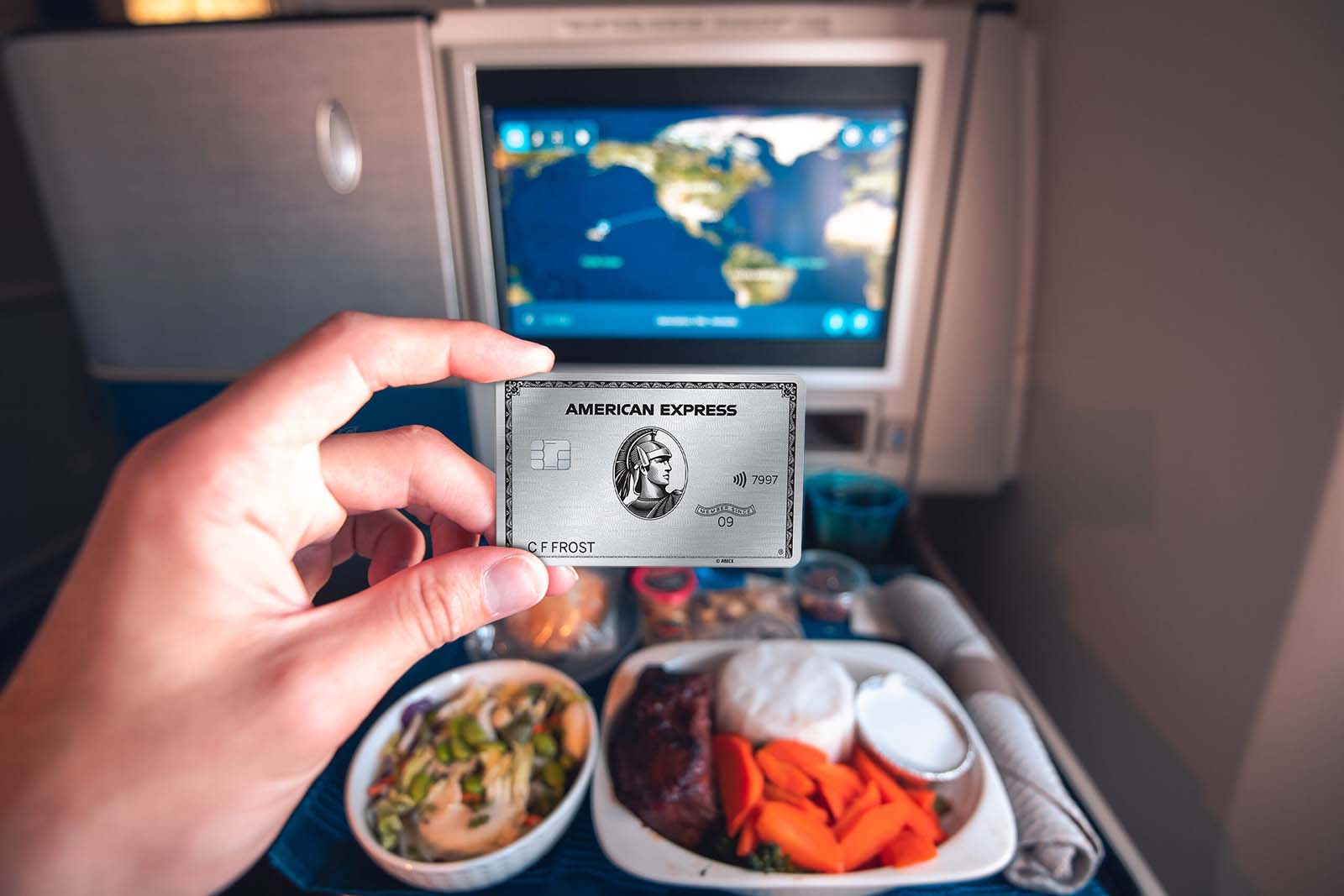
Usually, it's pretty easy for a traveler to fully maximize an annual airline fee credit of up to $200 over 12 months. First things first: Note that enrollment is required in advance before you can receive credit for this benefit in 2024.
To stay on top of all of your credit card perks and rewards in 2024, be sure to download the free TPG App .
5 suggestions on using the airline fee credit this year
Here are some ideas for using your Amex Platinum airline incidental credits throughout 2024:
- Pay for seat assignments and checked bag fees.
- Use it to splurge on food and beverages while inflight.
- Purchase airline lounge daypasses for future use. These are often valid for one year from purchase, but be sure to check the exact terms before buying any passes. You can purchase single-use passes from United for $59, American for $79 and from Alaska for $60. Also, know that this doesn't work 100% with all the airlines, so do some online searching for recent data points.
- Allow an authorized user to put the fee credit to use on one of their flights.
- Purchase Southwest EarlyBird boarding for future Southwest flights.
Enrollment is required in advance for select benefits.
Related: The ultimate guide to getting Delta Sky Club access
Choose the right airline
If you have an Amex Platinum , you can click here to select or change your airline choice each January (you'll need to log in to access your Amex account). You also can access the airline selection screen by scrolling to your online account's "Benefits" section. Either way, you'll see that you can choose from the following airlines:
- Alaska Airlines
- American Airlines
- Delta Air Lines
- Hawaiian Airlines
- JetBlue Airways
- Southwest Airlines
- Spirit Airlines
- United Airlines
Amex has been pretty lenient about permitting airline selection changes well beyond the usual Jan. 31 deadline for those who call or use the online chat feature to ask. There's no guarantee that it will work for you, but it's worth trying if you want to change your airline later in the year and haven't used any of the credit yet.
Generally speaking, you might assume that the airline you most frequently fly with is the one to choose. However, picking your primary airline automatically isn't always the best choice. That's because many fees are waived if you have elite status or a cobranded credit card with that airline , so having credits to reimburse you for checked bag fees or seat selection with that airline may not be useful.
Instead, consider an airline with which you're likely to incur at least $200 in fees each year.
For example, imagine that you fly United most frequently and also hold elite status with that airline, but you also fly American a few times each year. In this situation, you might be better served choosing American for your airline fee credit.
You could use that credit for things like seat assignments, extra-legroom seats, bag fees, onboard drinks or food. Remember that enrollment is required in advance to use this benefit through this direct registration link .
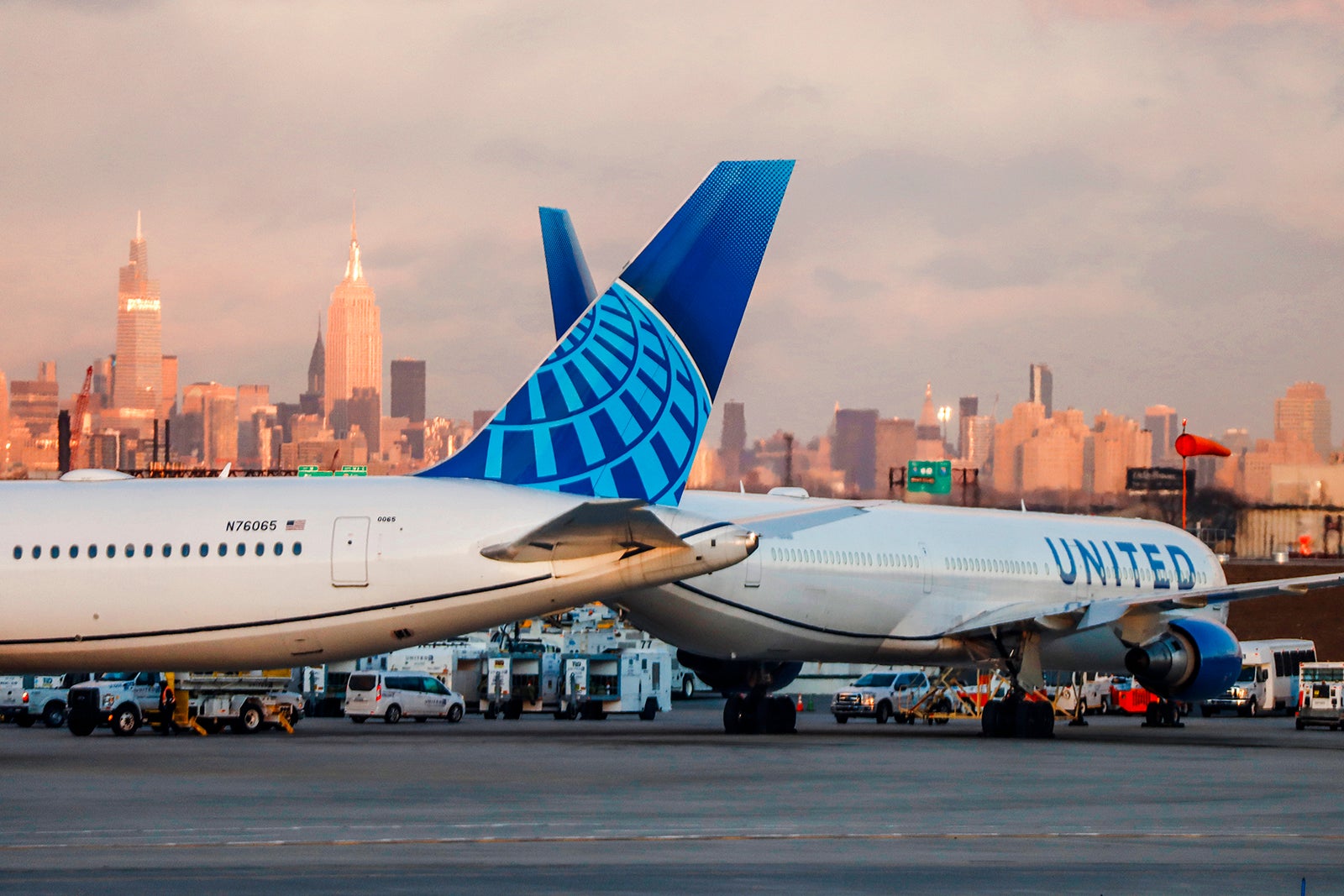
Don't forget about budget airlines, either.
Designating a low-cost carrier as your airline of choice could be a smart strategy since they charge extra fees for amenities that come automatically with some other airlines. This includes checked and carry-on bags , seat assignments and onboard snacks and drinks. Maximizing the Amex Platinum airline fee credit should be really easy if you designate and fly on a carrier that charges a high number of add-on fees.
What's covered by the airline fee credit
Generally, the following incidental fees will be reimbursed by using the Amex Platinum credit, as long as you make these purchases separately from the airline ticket itself (so the purchase will show up as a different transaction).
However, anything not expressly an incidental fee is not guaranteed to work and could change based on how the airline codes the transactions. For example, we've recently heard that United lounge passes can be coded as airfare and thus wouldn't be likely to trigger the credit:
- Checked baggage fees
- Overweight/oversized baggage fees
- Change fees
- Phone reservation fees
- Pet flight fees
- Airport lounge daypasses and annual memberships
- Seat assignment fees
- Inflight amenity fees (beverages, food, pillows/blankets, etc.)
- Inflight entertainment fees (excluding wireless internet)
As you can imagine, it's not difficult for many frequent travelers to use the airline fee credit in a typical year.
For example, you could select Spirit Airlines as your airline and then use the credit to purchase Big Front Seats , snacks or checked bags. Additionally, if you fly with your pet, based on the pet fees on most — but not all — airlines, you might use up your airline fee credit on just one or two flights with your pet .
If American Airlines is your selected airline, check out this post on which American Airlines expenses trigger the Amex airline fee credit . And here's a real-world look at what triggers the fee credit across more airlines .
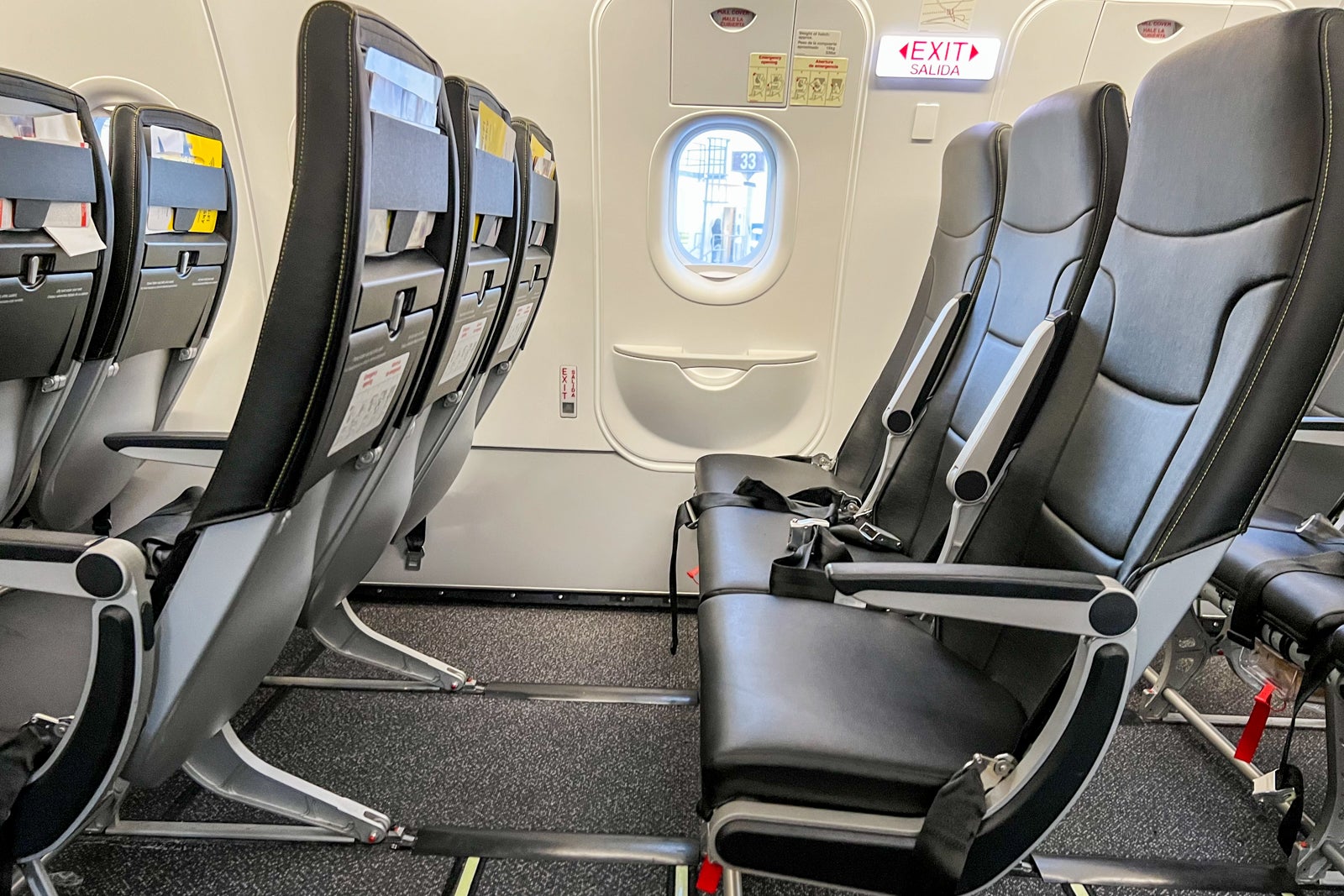
According to the terms, the Amex Platinum airline fee credit is not applicable for the following:
- Fees charged to other card accounts (besides authorized user accounts )
- Charges that aren't separate from airline ticket payments (for example, you may pay to select seats when purchasing a ticket but that may not trigger the credit)
- Fees not charged by the cardmember's airline of choice (for example, wireless internet and fees incurred with airline alliance partners)
- Incidental air travel fees charged prior to the selection of a qualifying airline
- Airline tickets
- Mileage points purchases
- Mileage points transfer fees
- Duty-free purchases
- Award tickets
The airline must submit the charge under the appropriate merchant code and required service or product identifier for the charge to be recognized as an incidental air travel fee. The terms say to allow six to eight weeks after each charge for the statement credit to post to your account (though, in our experience, it is often faster). If the credit hasn't posted after that time, you can call the number on the back of the card to get the credit manually approved for valid charges.
Related: How long does it take to receive statement credits from Amex?
It's also worth highlighting the bullet point for "fees not charged by the cardmember's airline of choice." If you book a ticket through your preferred airline but will fly on a partner airline, expect that you won't be able to use your incidental credits.
Here's an example. Say that your preferred airline is United, you book a flight through United's website, but you will actually fly on Air Canada. When you check-in at the airport with Air Canada, checked bag fees would be charged by Air Canada — not United — so you wouldn't be able to use your Amex Platinum incidental credits here.
As with most things, there are clear-cut cases when the credit reliably does and does not work while there also are some grey areas. For example, we have heard reports that the airfare credit kicks in when you pay for a portion of a Delta ticket with a gift card and then charge the remainder to your Amex Platinum. This happens because the remaining airfare becomes an "additional collection" and triggers the reimbursement credit.
Sometimes, other small airline ticket purchases, Travel Bank reloads and even the taxes/fees also trigger the credit, as have some purchases of smaller ($50-ish) amounts of future airline travel credit.
However, those are off-label uses that could change at any time. Additionally, remember that only purchases with the airline you selected will trigger the credit.

Other Amex cards with airline fee credits
The Amex Platinum isn't the only Amex card that offers an annual airline fee credit (up to a certain amount). The following Amex cards also offer credits (advance enrollment is required):
- The Business Platinum Card® from American Express (up to $200)- enrollment is required
The Hilton Aspire did have a $250 airline fee credit, but it has been replaced with a $50 quarterly airline credit valid on eligible flight purchases made directly with an airline or through amextravel.com.
The information for the Hilton Aspire Amex card has been collected independently by The Points Guy. The card details on this page have not been reviewed or provided by the card issuer.
The details of the airline fee credit on these cards and the Amex Platinum are similar. But there's one important wrinkle for the Business Platinum Card . Business Platinum cardholders receive a 35% rebate on any points redeemed for business- or first-class travel on qualifying airlines when booked through Amex Travel (up to 1 million points back per calendar year) or when using Pay with Points to book travel on their preferred airline — the same airline associated with the $200 in annual airline incidental credits.
Related: Why I love the Amex Business Platinum's Pay With Points perk
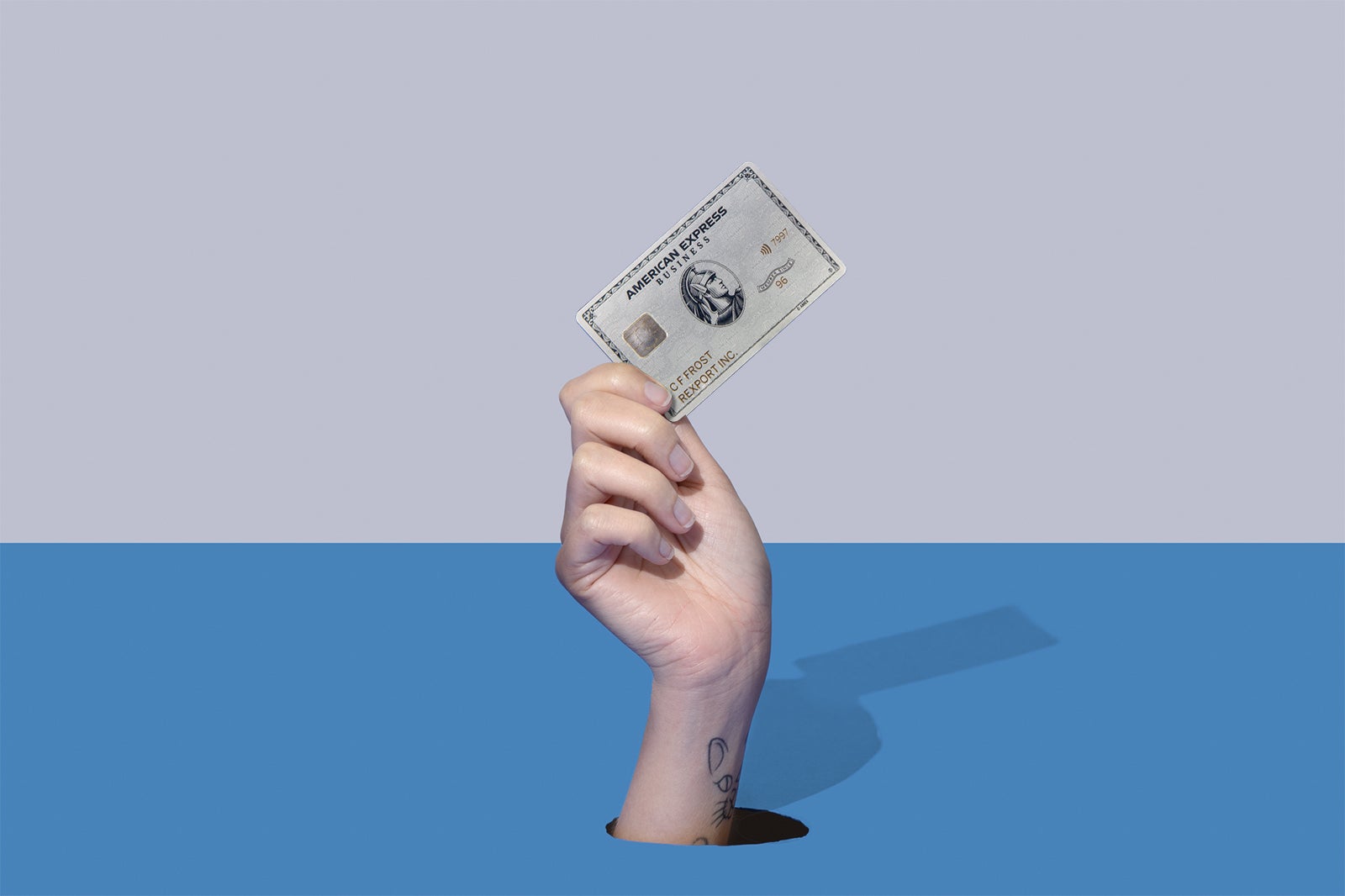
Because of that, Business Platinum cardholders may want to select an airline for which they use points to purchase economy tickets for their annual airline credit, instead of one where they'll incur fees that the credit can offset.
Bottom line
The up to $200 Amex airline fee credit is one of those use-or-lose benefits that is only worth what you make of it.
Normally, it's pretty easy to maximize this airline fee credit if you understand how it works and have a plan for the year ahead. At this point, you should have a good understanding of what does and doesn't work for the Amex Platinum card's airline incidental credits and how you can use these credits even if you aren't traveling right away.
Official application link: Amex Platinum Official application link: Amex Business Platinum
For rates and fees of the Amex Platinum, click here . For rates and fees of the Amex Business Platinum, click here .
Suitcase hacks: Never pay baggage fees again with these tips for efficient packing
Are you tired of grappling with overstuffed suitcases and annoying baggage fees when you travel? You’re not alone. Efficiently packing and organizing for trips like a pro is an art that we’d all love to master in order to make your journeys more enjoyable and hassle-free. Luckily, there's a wealth of easy, tried and tested packing tips and hacks at your disposal that will revolutionize your travel game and reduce or even eliminate some of those expensive baggage fees. From clever folding tricks that save space and keep your travel outfits organized to ingenious tools for neatly corralling your essentials, we’ve got you covered. Here are the best simple tips for mastering efficient packing before your next getaway.
Watch the video above to learn how to master efficient travel packing.
Efficient packing tips and hacks
- Be sure to check the weather forecast right before traveling to ensure you pack appropriate clothing for all times of day in order to stay comfortable.
- Plan outfits for each segment of your trip ahead of time. This will prevent you from under or over-packing.
- Roll a whole outfit into one bundle.
- You can also roll your underwear in your outfit bundle so everything you’ll need is ready to go. When rolling, place your shirt on the outside of the roll (which means it will be on the bottom of your pile when you start) so it’s easy to distinguish what the outfit is.
- Packing cubes are affordable and come in all different sizes. They even sell special packing cubes for shoes.
- You can also pack extra empty packing cubes for dirty clothes to keep your suitcase and clothing supply organized throughout your trip.
Tips for packing light
- Plan and research your trip carefully. The more you know about your destination and the activities you’ll engage in, the easier it will be to pack only the essentials.
- Travel with a scale so you never have to pay overweight baggage fees. This also helps you audit your gear during the packing process so you can distill it down to only the essentials before you travel.
- Pack versatile clothing. Choose clothes that can be dressed up or down and coordinate with multiple outfits throughout the day, like nice denim, versatile pants and dresses. This will reduce the amount of clothing you'll have to pack.
- Pack layers. Layers are a great way to stay comfortable in any climate or environment because you can add or remove layers as needed and reduce the amount of clothing you'll have to pack. This also adds to versatility - a nice sweater or jacket can be dressed up or down and be made appropriate for multiple activities.
- Pack versatile shoes that can be worn for many activities instead of shoes for each outfit. For example, sneakers can be worn casually for a day exploring a city and dressed up for dinner or a night on the town. Shoes can take up a lot of space in a suitcase, so minimizing the number of shoes you travel with can be key to creating more space.
- Pack smaller, travel-sized toiletries. Skip the full-sized toiletries and pack travel-sized toiletries that take up less space and fall within TSA liquid size limits to avoid baggage fees.
Reviewed-approved travel recommendations
Purchases you make through our links may earn us and our publishing partners a commission.
Reviewed helps you find the best stuff and get the most out of what you already own. Our team of experts test everything from sleep masks and travel pillows to luggage and packing cubes to help you shop for the best of the best.
- Tracking game-changer: Apple AirTags
- Our favorite sleep mask: Mzoo Sleep Eye Mask
- A top wireless charger: Yootech Wireless Charger
- Must-have luggage: Travelpro Platinum Elite Softside Expandable Luggage
- Organization hack: Amazon Basics 4-Piece Packing Cubes Set
- The best portable battery pack: Mophie Powerstation Plus
- Our favorite travel pillow: Cabeau Evolution Classic Travel Neck Pillow
- Top-rated adult coloring book: Cindy Elsharouni Stress Relieving Adult Coloring Book
More problems, solved
- Vacation deals: How to plan a budget-friendly trip
- Travel apps: What to download before you fly
- Wrinkly clothes: How to get wrinkles out without an iron
- Pool day: Stop ruining your swimwear
- Camping food: How to prep like a pro
- Dirty backpacks: How to properly clean bags and lunchboxes
- How to clean suede shoes without ruining them
- Soaking phone: How to fix water damaged phone
- Make your phone more efficient

IMAGES
VIDEO
COMMENTS
Here's a rundown of some of the costs: Quickbooks: 2.9% for swiped transactions or 3.4% for manually entered transactions plus a $.25 per transaction fee. If you're rolling in $7,500+ per month in service fees, you'll need to dish out a monthly fee. PayPal: 2.9% plus $.30 per transaction.
At Travel Experts, the Raleigh, N.C.-based host agency that sits at No. 26 on Travel Weekly's 2022 Power List, a recent survey of its advisors found that 85% charge fees.
Travel agent fee: $100 for custom itinerary. Total trip cost: $8,000. Trip cost included two nights in New York, air travel to and lodging in Prague (for a wedding), then travel and lodging for Rome, Venice and London before returning home. All-inclusive trip for two to Jamaica coordinated by Russell of Grand Sunsations Travel .
Usually, the cost of hiring a travel agent to organize a trip for you is fairly minimal. Many agencies charge a flat fee of around $100, and others may charge a certain small percentage of your ...
The amount of the fee is dependent upon your agency's overhead, your business plan and the amount of commodity transaction the agency performs. Understand that a transaction fee is a charge for completing a transaction, not a service fee that implies ongoing service. As an example, an airline ticketing fee does not include refunds, changes or ...
The 2018 Fee Survey from Host Agency Reviews, an independent website connecting home-based agents and host agencies, mostly echoes Travel Weekly's research. The data shows that 47% of hosted agents charge some type of fee — whether consultation, service or otherwise — while 71% of independent advisors charge fees. Both hosted and ...
In the past, a travel agent charging a fee for their services was unheard of. But the value of travel agents has become more apparent than ever, especially since the impact of COVID-19 on the industry has been a significant one. It's now becoming more mainstream for these professionals to charge fees for their services.
Apr 16, 2021. Travel agencies are rethinking their fee structure strategies due to COVID-19. Credit: 2021 H_Ko/stock.adobe.com. When it comes to charging service fees, there has never been a one-size-fits-all approach that works for every travel agency. But now, the COVID-19 pandemic has made many advisors rethink their strategy — and more ...
According to the Gifted Travel Network, most successful travel agents are charging over $125 for a fee. You can always start around that price range where you feel most comfortable and increase in the future. You can also set limits around this fee. For example, if you are asked to plan a trip for a large group which include many tours ...
Okay, so the intro had a spoiler: 75% of independent travel agents reported charging fees in 2020. This is a 4% increase from our last fee survey in 2018, when 71% of independent agents reported charging a fee. 1. Among independent agents who charged a fee:
Some people like to charge a flat fee for travel. For example, one's travel fee structure might look like this: 0-25 miles - FREE. 25-50 miles - $35 Flat Fee. 50-100 miles - $125 Flat Fee. This option is much less popular. One positive aspect is you can make one tier meaningfully more expensive than another.
The most common fee is a general booking fee (87%), followed by change fees (47%), cancellation fees (42%), group booking fees (33%) and concierge fees (33%). Only 6% charge an hourly fee. RELATED: How Travel Agencies Are Rethinking Fee Structures The majority of advisors (56%) charge both standard fees and variable fees. Nearly all respondents ...
The median fixed rate for flat fees was $150 in 2020, a drop from 2019 when the median was $200. However, more independent advisors reported charging a variable rate, 58%, compared to the 42% with a fixed rate. The variable rate of flat fees increased in 2020, $100-$500 compared to $88-$350 in 2019.
Travel agent fees vary from agency to agency, but to give you a quick idea, you can find a typical range between $100 to $1200 depending on the destination, length of stay and complexity of the itinerary. In keeping with my honesty and transparency, I feel it's necessary to have an open discussion about travel agent fees, why Destinations HD ...
Now, about actually affording a travel advisor. Bunker said the fees for consultation and research can vary based on the complexity of a trip and an advisor's experience level. They can charge a flat fee — a 2018 survey from Host Agency Reviews found the median flat fee for consultation was $75 among agents who charged — or one-off ...
Most travel agencies take between 9% and 15% commission for anything to do with services, stays or tours. For a single airline ticket sold, a travel agency might take 8% of the public price. However, this percentage varies from one travel agency to another, depending on the services they offer. Some travel agencies may charge between 15% and 20 ...
I'll share my minimum recommended travel planning fees based on whether you are a newer agent or at least new to charging professional planning fees, as well as for the season travel expert. Again, these are just examples and my professional opinion. I have been a travel agent since 2008 and have changed my fee structure multiple times.
If you're considering if you should charge fees as a travel agent, hear some important advice and considerations from an experienced travel agent. 1.888.611.1220 Get Started!
Should you need to cancel a trip booked through a travel agent, you may also need to pay them a cancellation fee, on top of any fees charged by the airline or accommodation. Walker from Flight ...
Typical Fees Charged by Travel Agents. Most travel agents will charge a fee for their services, which can range from a flat rate to a percentage of the total cost of the trip. For example, some agents may charge a flat fee of $50 for their services, while others may charge a 10% commission on all bookings. Additionally, some agents may offer ...
Some travel agencies charge a flat fee per ticket, while others may impose a percentage-based fee relative to the cost of the flight. Paying an airline ticketing fee provides travelers with several advantages. First, it saves them time and effort by allowing the travel agency to handle the complex and time-consuming process of searching for and ...
Show Me the Money. Depending on your level of commitment to us, we estimate the basic startup costs to own your own travel agency include: Training: $295-$895. Host Initiation Fee: $0. Typical Business Startup Costs: $500. Commitment to Us as Your Host Agency (Annually): $240-$840. For a grand total of anywhere between $1234 to $2074.
"Service fees for reservation of airline tickets and hotel rooms through travel agents or websites are becoming more widespread," said Erika Pacini, a travel expert and head of marketing at Outdoorplay. "These charges vary between $10 and $50 per transaction, which can add up fast if one uses several services."
For example, many non-travel credit cards will charge a fee when you make a purchase that is processed outside the U.S. ... The Capital One Venture X Rewards Credit Card charges a $395 annual fee ...
1. Pay for your tickets with an airline credit card. Some airline credit cards include free checked bag benefits. Many of the best airline credit cards provide a first checked bag for the ...
"You probably need to give yourself, ideally, six weeks." Extra protection. When you book a trip between £100 and £30,000, try and pay for some of it on a credit card to get "extra protection ...
The commission percentage agencies earn on air depends on numerous factors, the most important one being which private contracts you have access to. Here's a general rule of thumb on the airline ticket commission range you can expect as a travel advisor: Domestic: 0-5%. International: 10-22%.
Rental car companies typically charge an added fee for drivers under the age of 25—often referred to as the Under 25 fee—as younger renters are considered to be higher-risk drivers.
Business Platinum cardholders receive a 35% rebate on any points redeemed for business- or first-class travel on qualifying airlines when booked through Amex Travel (up to 1 million points back per calendar year) or when using Pay with Points to book travel on their preferred airline — the same airline associated with the $200 in annual ...
Skip the full-sized toiletries and pack travel-sized toiletries that take up less space and fall within TSA liquid size limits to avoid baggage fees. Reviewed-approved travel recommendations